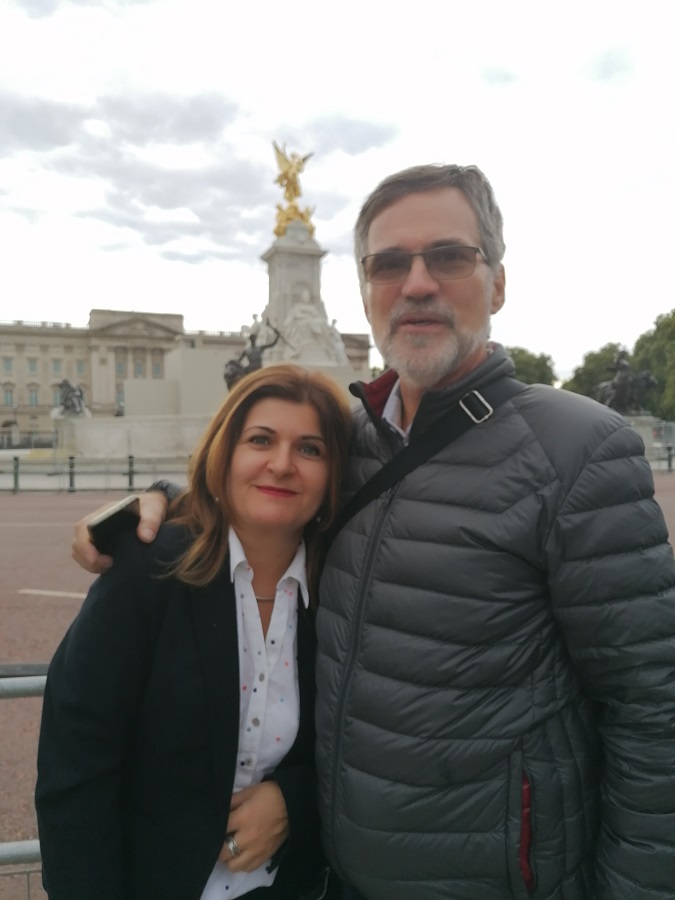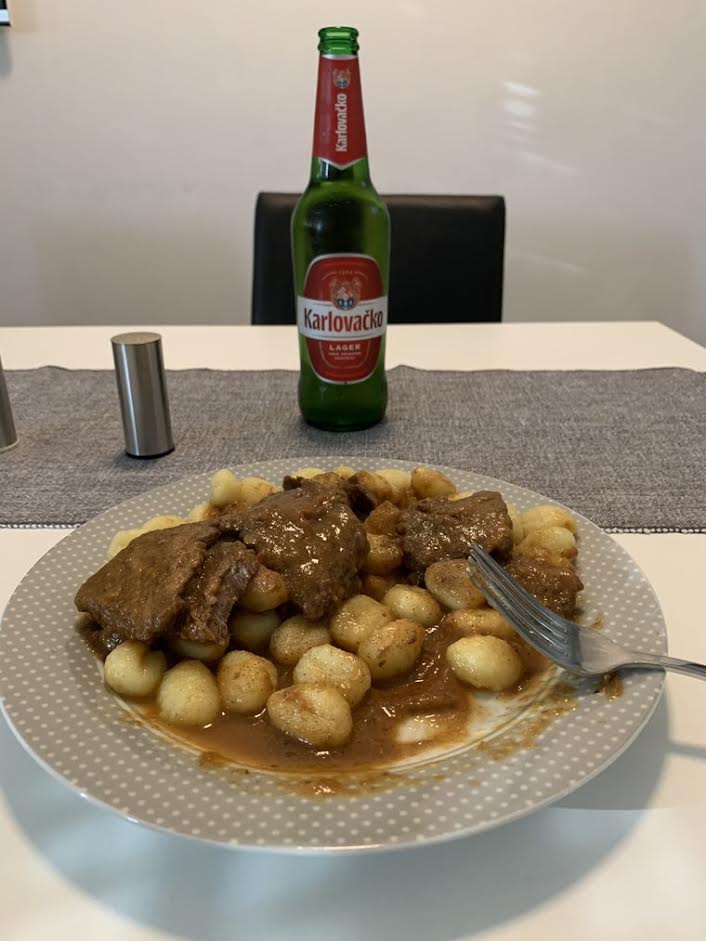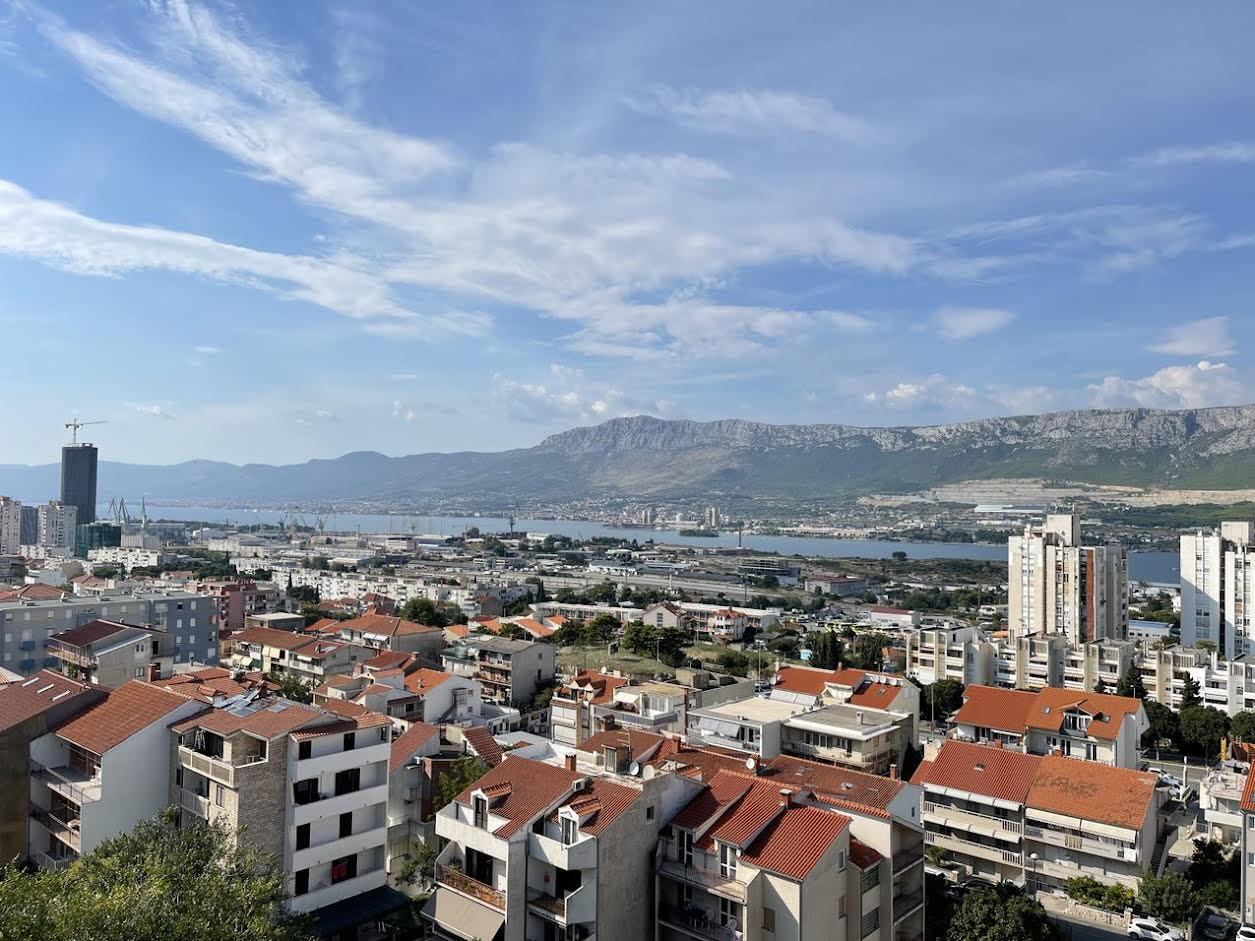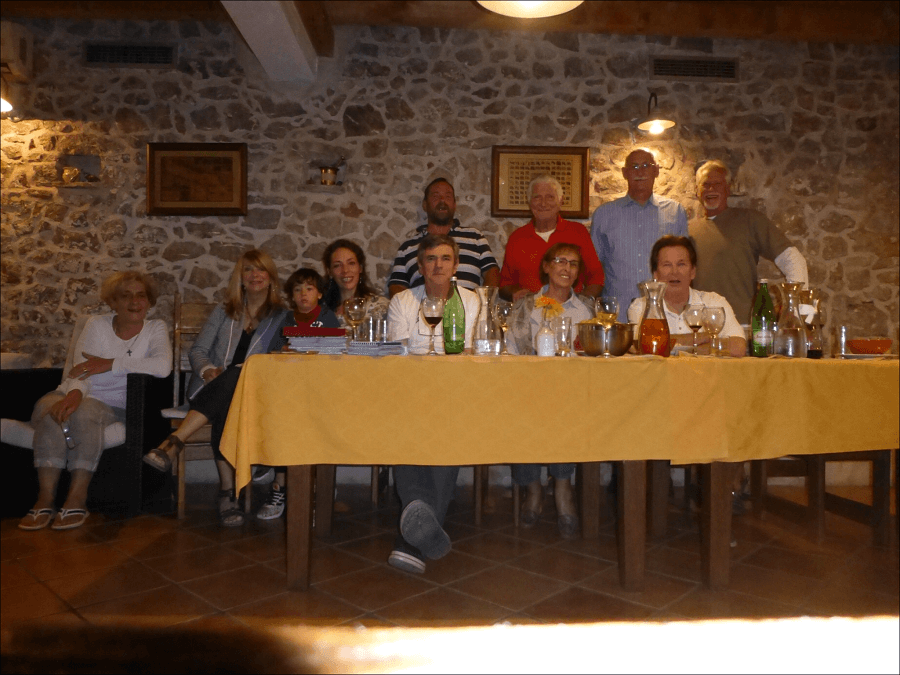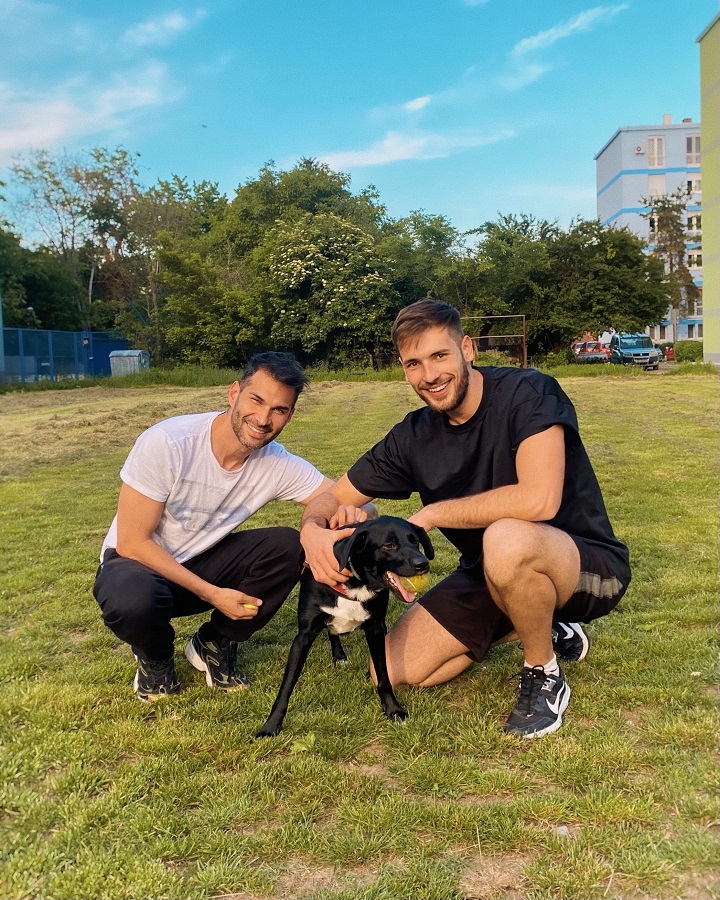Croatian Returnee Stories: Australia's Oldest Married Couple from Vrgorac
October 17, 2022 - Did you know that Australia's oldest married couple (82 years) hailed from Vrgorac? The fascinating TCN returnee inbox contributions continue. And the returnees keep on returning.
The TCN inbox has never been dull, but since I posted an offer of a free interview to any returnee who wanted to share their experience of moving back to the Homeland, things have been very interesting indeed.
The TCN series, Croatian Returnee Reflections has been a big hit - check out the stories so far here. If you want to share your returnee story, contact This email address is being protected from spambots. You need JavaScript enabled to view it. Subject Returnee
That led to the first TCN/AVG Returnee Drinks Night in Zagreb, which was attended by more than 50 people. This will become a regular monthly event.
That in turn led to the formation of the TCN/AVG Croatian Returnee Networking Facebook Group. All welcome.
And the inbox keeps on giving with more stories of those returning or planning to return, including Michael, whose relative was part of the longest marriage in Australian history!
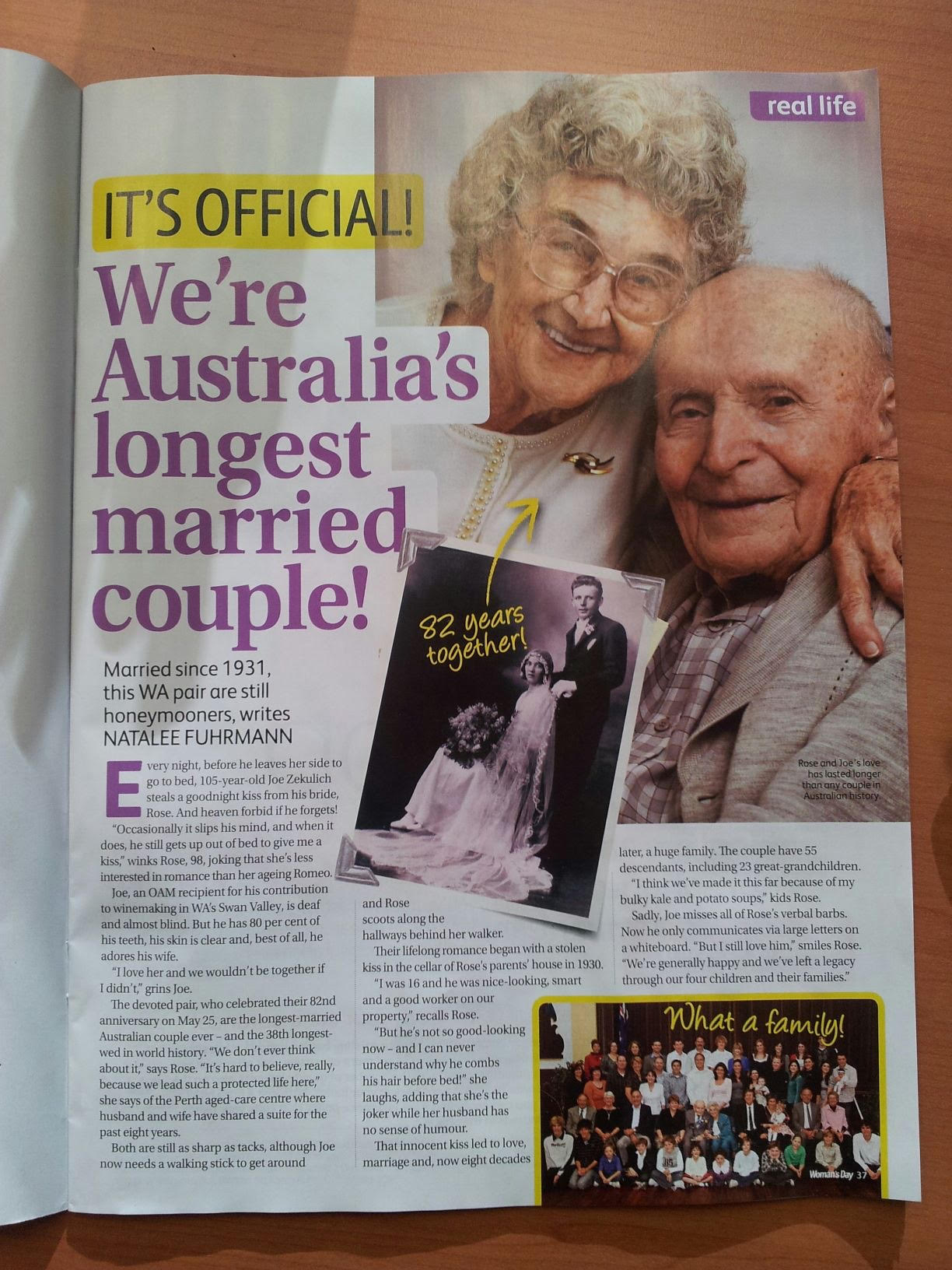
Hello Paul
I'm enjoying the articles very much on those Croats who have relocated to Croatia through their descendants and parentage
I am of Croat heritage (born in Western Australia) through all my descendants on both sides of my family (Tolj-Turkic i Ajduk) who relocated from Vrgorac in the early 1920s and started the wine industry in Western Australia. Of particular interest is my great uncle Joze Zekulic who died at 108 having been married for over 80 years to my great Aunt Ruze Zekulic (nee Beus), Australia's oldest living married couple at the time, and 12th oldest in the world. Now sadly both passed on.
I have applied for my citizenship with a view to retirement, and I'm sure others of my age group would like to follow the story and share theirs.
I asked Michael to send me some details.
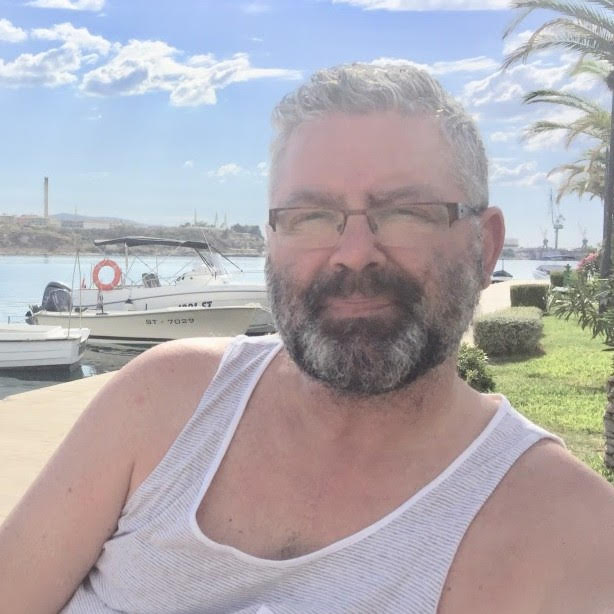
Hi Paul
Thanks for your response
Insofar as your thread for the website is about relocation and acquiring Croat citizenship my experience is noted below (tried to keep it as brief as possible, but its beaurocracy right?) so here goes:
Croats in Western Australia:
I am the grandson of two great WA Croat families: On my mother's side Ajduk & Beus, and on my father's side, Tolj-Turkich, later upon arrival in Australia, just Turkich, both families originally located im Zavojane (Ajduk) and Stilja (Turkic) with my great grandmother's family (Ante i Antica Beus) just "down the hill" in Podgora.
Having now lodged my application for Hrvat citizenship here in Sydney through my paternal grandmother: Ruza Turkich (nee Turic) as the other records no longer existed, I suspect due to war, fires, dislocations, and other loss-inducing events.
Both Andrija Ajduk (maternal grandfather) and Joze Tolj-Turkic left Croatia in the early 1920s, their wives and families following 4-5 years later. Andrija Ajduk was also a personal bodyguard to the late King Peter Georgevic.
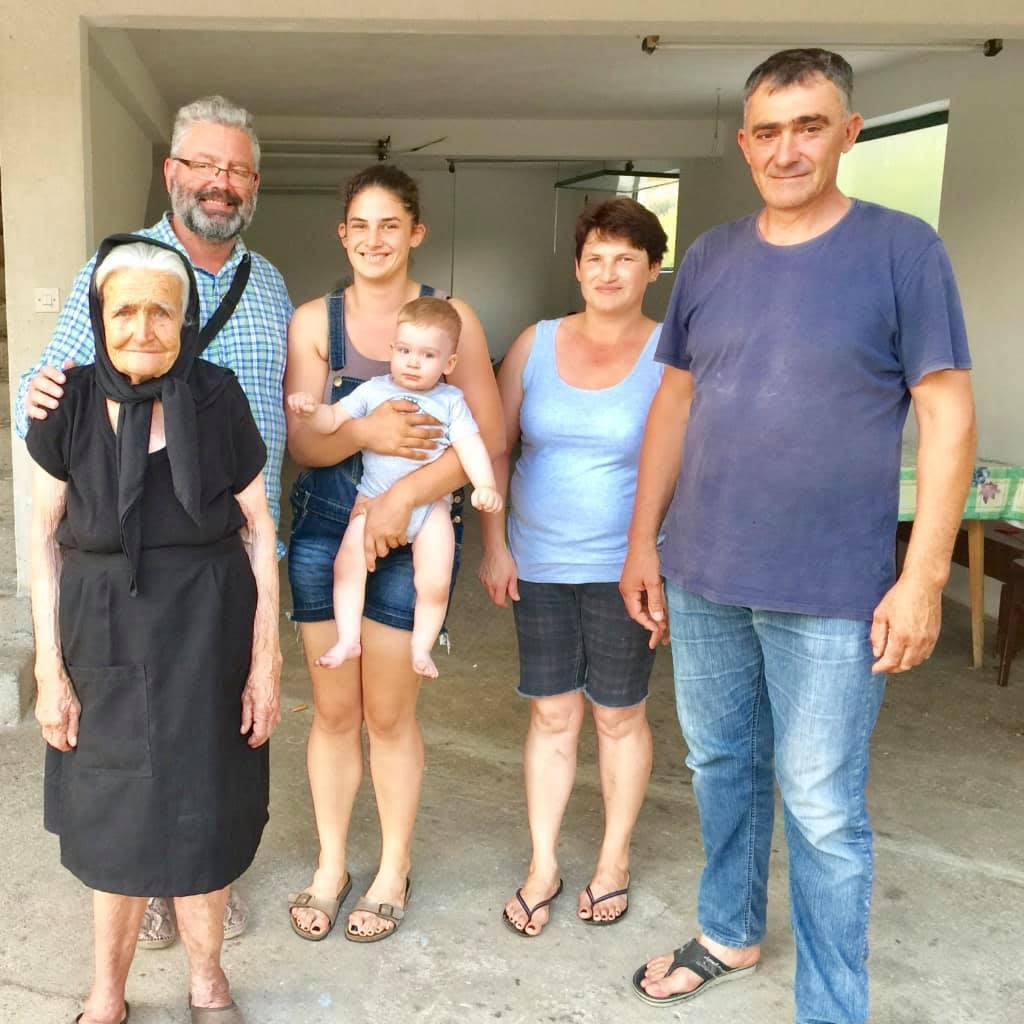
Andrija's wife (Mara Zekulic) passed away after complications from childbirth, leaving their infant son Tonko, in the care of his maternal grandmother while his father sought a better life in Australia than that which could be provided in Croatia after WW1.
Andrija was one of 5 siblings: Ivan, Ruza, Jure, Mate, all using the name AJDUK except for MATE who migrated to the USA in 1919, changing his name to MATTHEW HYDEK. Jure and Ivan stayed in Zavojane, and I am close to them to this day, having just returned from summer there in Makarska, which is the closest port town to Zavojane and Stilja
Andrija upon arrival to Perth in Western Australia quickly made his way to Kalgoorlie, the most productive and richest plot of gold in the world at that time. As he was a toolmaker, his skill set was in demand in the mines.
He met and married his second wife DIANA BEUS soon after, then brought his son Tonko to Australia. Now 12 years old, this boy arrived with no English, a father he hadn't seen in 10 years, and a new mother he never met before. Can you imagine? He is still with us in Perth aged 98.
Joe Turkich arrived around the same time to Perth on the SS Orsova with his wife Ruza and daughter Matija and son Mate arriving 5 years letter once they had all been granted citizenship. And we complain about beaurocracy today!!
He was a teamster and had horses haul timber to mills in South West WA prior to making the move to the famous SWAN VALLEY outside of Perth and beginning planting grape vines.
At the same time, Joze Zekulich migrated to Australia, married Diana Beus' older sister Ruze and they lived to become Australia's oldest living married couple and 12th oldest in the world. Wow! Ruza (Rose) passed at 98 years of age, Joe at 108. He was also inducted into the WA Agrivcultural Hall of Fame for his skills in blending and breeding grape stock that was resistant to Phylloxera and other funguses and pests associated with viticulture.
Other Croats in the valley also growing grapes, winemaking, running orchards and market gardens were in no particular order: Talijancich, Pasalic, Saric (Ralph the inventor of the Orbital Engine), Pervan, Boksich, Botica, and others.
You can follow the TCN Croatian Returnees series here.
****
What is it like to live in Croatia? An expat for 20 years, you can follow my series, 20 Ways Croatia Changed Me in 20 Years, starting at the beginning - Business and Dalmatia.
Follow Paul Bradbury on LinkedIn.
Croatia, a Survival Kit for Foreigners is now available on Amazon in paperback and on Kindle.

Next Stop Zadar! 50+ Attendees at TCN/AVG Returnee Reflections Night
October 12, 2022 - The inaugural TCN/AVG Croatian Returnee Reflections night took place in Zagreb last night. It will be the first of many.
Things are changing.
Slowly.
But I can feel it.
It is still a trickle, but the diaspora is starting to return to the Homeland.
A younger generation, not blinded by politics and Communism conspiracy theories, but rather enthused with love of their roots and with an entrepreneurial spirit.
And this whole thing escalated VERY quickly.
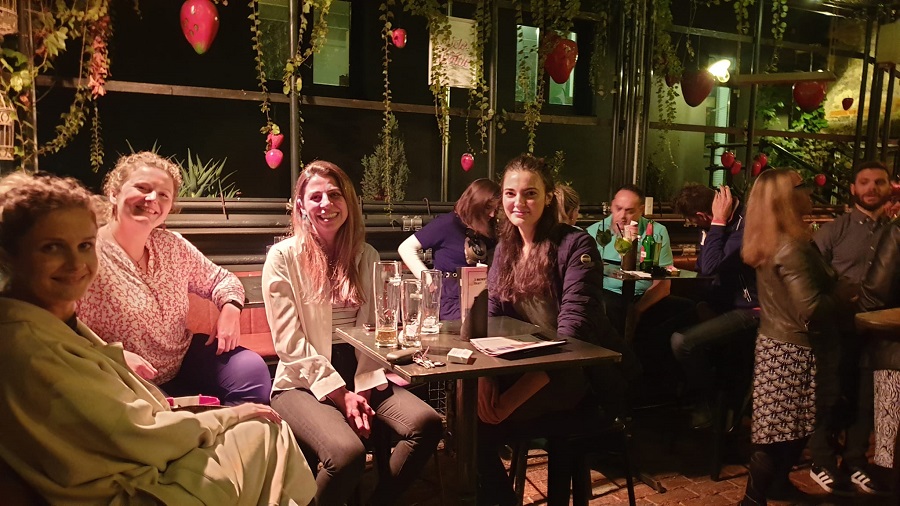
One month ago, I posted a status on Facebook and LinkedIn. I have always had lots of email from the Croatian diaspora over the years, but it has increased considerably this year. My haters still send in their abuse and occasional death threats, but less so. I do miss their love though - does anyone have a better epitaph on their tombstone than me? 'Tito cock-sucking British Jew writing fluff to humanise mass murderers in the Jewish style when socially engineering a people for ruin.'
But the increased email activity is coming from returnees, both actual and wannabes. More and more people are getting in touch to tell me about their experiences returning to the Homeland and giving it a try. And even more telling me how they would like to return but there is so little information.
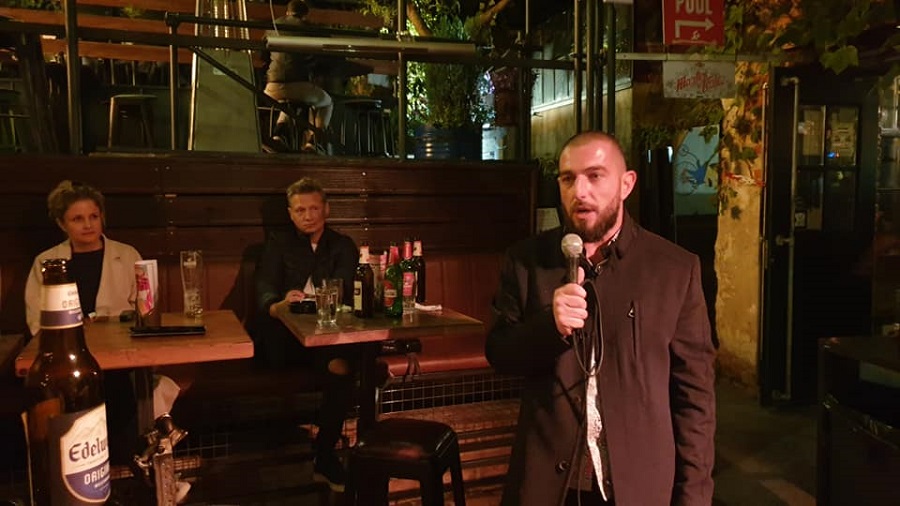
And so a month ago, I posted that I would be happy to do interviews with any returnee who wanted to share their experiences. I was stunned by what happened next. No less than 63 returnees contacted me, all wanting to share their story. Not all were positive experiences, but I agreed to publish them all, good and bad, to give those thinking of returning a better overall picture. The Croatian Returnee Reflections series has been the most interesting thing on TCN in recent weeks, and you can follow it in the dedicated section here.
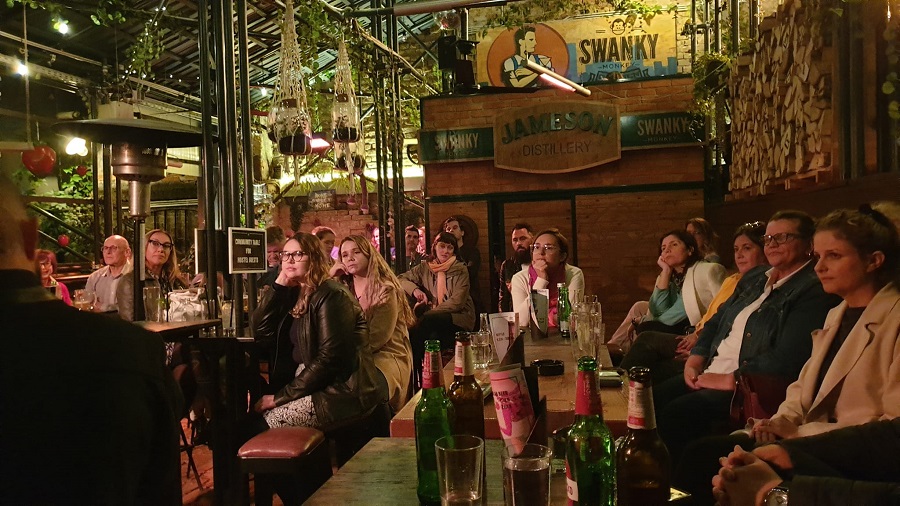
A few days ago, another returnee called Marija Franic contacted me on LinkedIn to ask if we could organise a returnee event, so that people could meet, exchange experiences, and network. I tested the idea on social media and invited those who had done interviews for the series and lived in Zagreb. The response was very positive, and Sime Lisica from Bibinje via Sydney also got involved. And so the concept of TCN/AVG Croatian Returnee Reflections Nights was born, the first of which took place at the fabulous Swanky Monkey Garden in Zagreb last night.
Am very grateful to our named speakers for sharing their stories - Eugene Brcic Jones, Andrian Juric, Maria Pokrivka, and Sime Lisica - as well as about 10 others who stood up to share their stories.
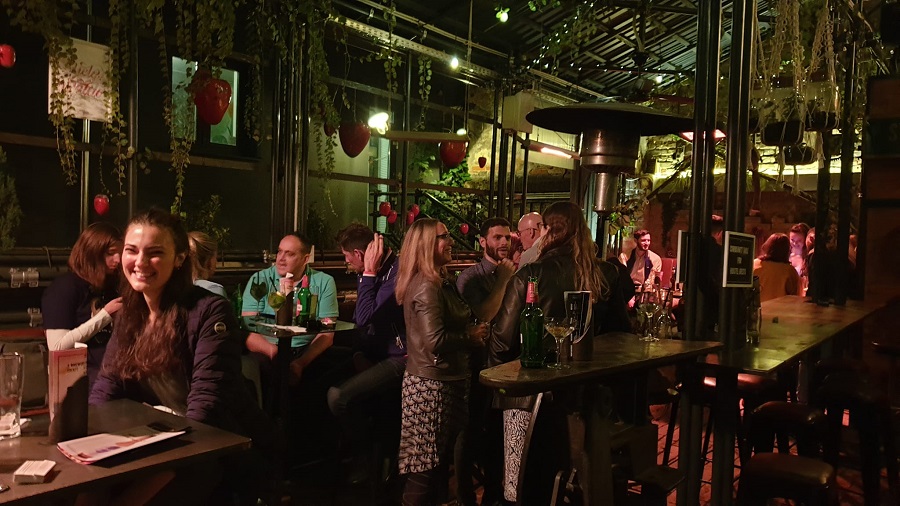
I think many were surprised at just how many returnees showed up, and I also think that people are slowly beginning to see that there are a growing number of returnees bringing their positive mindset.
It is time to connect them, to tell their stories, and to show those thinking of making the move that - as flawed as Croatia undoubtedly is - the benefits outweigh the problems. Not for everyone, as Croatia full-time is most certainly not for everyone, but for many.
It was a wonderful evening of new connections, heartwarming stories, and lots of laughs, and one which we agreed we would repeat soon.
Sime has agreed to work with me on this, and we will start to organise regular TCN/AVG Croatian Returnee Reflections Nights all over the country in the coming 12 months. We will do one more in Zagreb next month, then Zadar is next on the list, as there seems to be a growing returnee community there. We plan to do this in December when I visit Zadar for the book promotion event for Croatia, a Survival Kit for Foreigners, which is out now on Amazon.
I will create a TCN/AVG Returnee Networking Facebook Group in the coming days to see if we can find ways to better connect and get the story out. Additionally, with the imminent relaunch of TCN, the online magazine with news, we will have a big section on How to Return. This will be full of practical advice as well as real experiences. If anyone wants to help me with this, please email This email address is being protected from spambots. You need JavaScript enabled to view it. Subject Returnee Help.
Thanks to all who came last night. I think we took the first step in what could be an incredibly interesting journey.
If you would like to share your returnee experience, contact This email address is being protected from spambots. You need JavaScript enabled to view it. Subject Returnee
****
What's it like living in Croatia, and where can you get the best survival tips? TCN CEO Paul Bradbury and TCN Editor Lauren Simmonds have teamed up to publish Croatia, a Survival Kit for Foreigners - out now on Amazon.
Follow Paul Bradbury on LinkedIn.

Croatian Returnee Reflections: Zeljka Tomljenovic, from London to Zagreb
October 8, 2022 - Whisper it quietly, but more and more people are relocating to Croatia from the diaspora. In a new TCN series, we meet them to find out how they are faring and what advice they have for others thinking of making the switch. Next up is Zeljka Tomljenovic, who moved from London to Zagreb.
I was born in Slavonski Brod, where I went to primary school then I went to secondary school in Bosanski Brod. I completed the rest of my formal education at the University of Novi Sad. This variety of places where I lived in Former Yugoslavia seems to set me up for my future of travel in the years to come. Then my life brought me to London, where I lived and worked for the next twenty-six years where I experienced the life that only metropolitan cities can provide. My work there was in the event management industry, and also I volunteered for the charity organization, The British-Croatian Society.
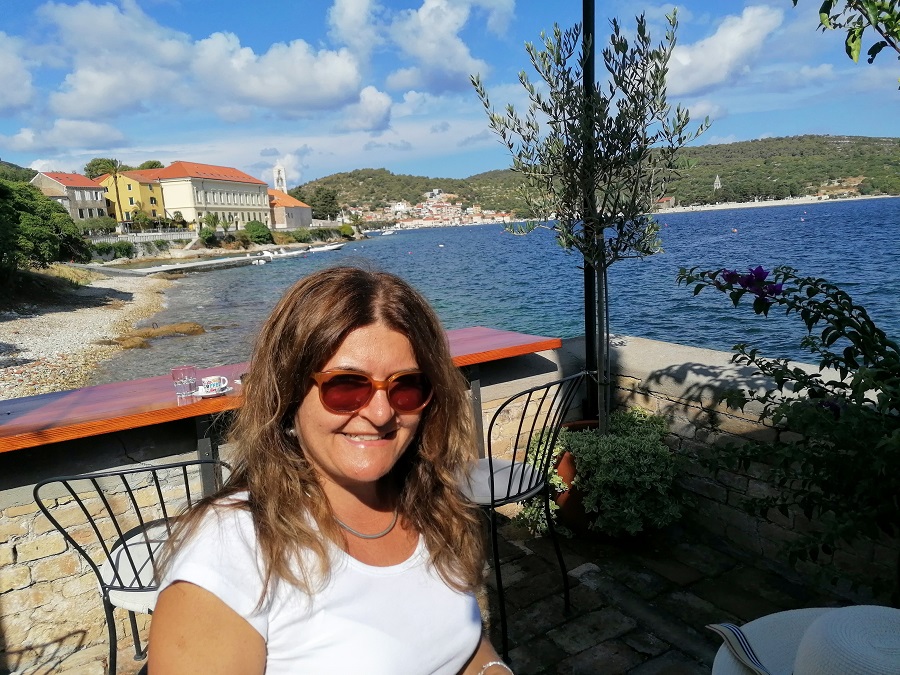
1. You made the switch to Croatia. Tell us a little about the decision process and how long it took for you to get on the plane.
Funny to say, but it was not a decision at all. It was rather an accidental step that had happened swiftly without my consideration that brought me to Croatia. When I realized that the Paddington area, where I worked, as well as the whole of London, was getting emptier by day to day due to the Covid-19 closure, I had to pack up my stuff and secure one of the last seats on a plane to Zagreb.
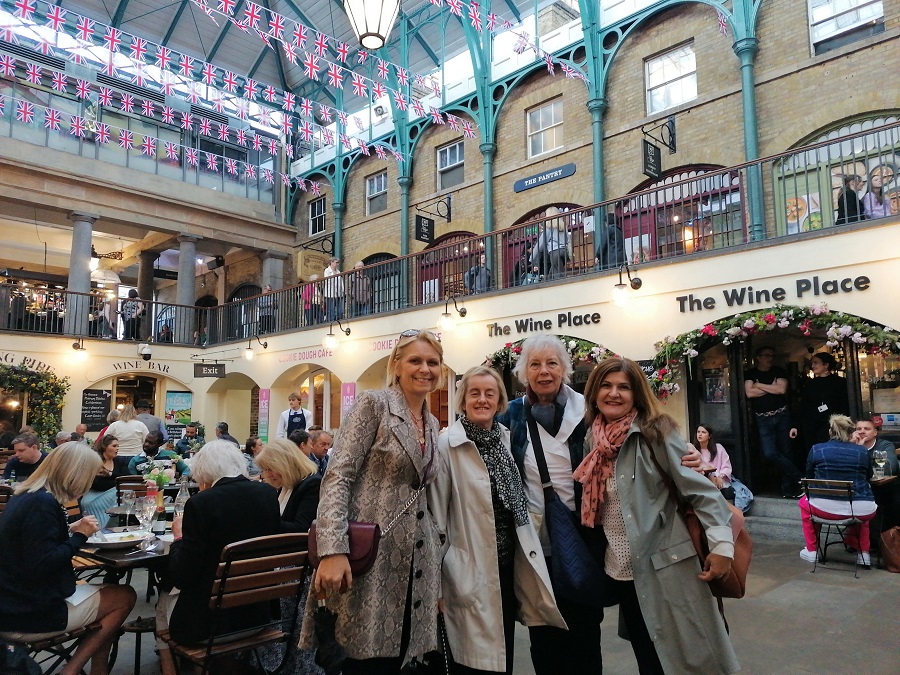
2. What did your family and community back home think of your decision at the time?
When I arrived in Zagreb, the situation and outcome of the Covid-19 crisis were very uncertain, so my return at that particular moment seemed a logical step regarding the circumstances. At that time, I started working from home, believing that it would be just a temporary solution. I felt very supported by my family and friends. As the whole world around me was closing down, coming back to Croatia was a move in the right direction and at the right moment. The funniest reactions on my return I am still receiving from those people that have never lived abroad. They normally look me in the eye with a bit of pity, asking me whether I am really aware of what I've done :-).
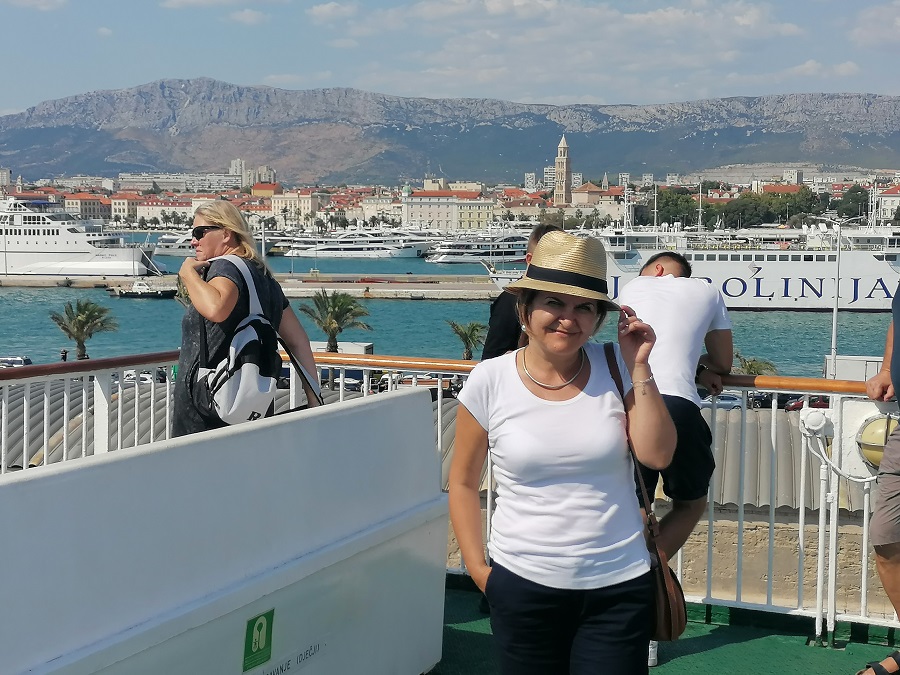
3. Where did you get your information about the realities of Croatia prior to coming?
My touch with Croatia and its reality was continuous through the years I lived in the UK. Also, through my activities with The British-Croatian Society, the charity organization that promotes links between HR & UK for many years, I kept my relations with both countries widely open.
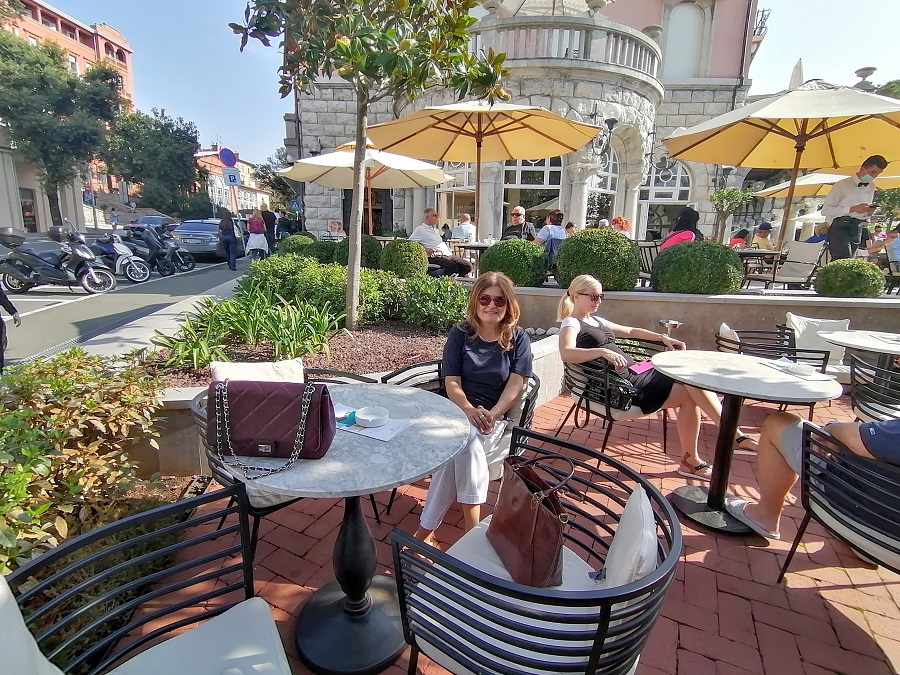
4. What were you most nervous about making the switch? What was your biggest fear, and what was the reality of what you found?
It was a very big decision. No doubt about that. My life and work were set up in London, I was always on the go, I had a lot of friends and colleagues there, and I had a busy social life. I was not surprised by anything I found here as I was coming to Croatia quite frequently, and I was fully aware of its reality.
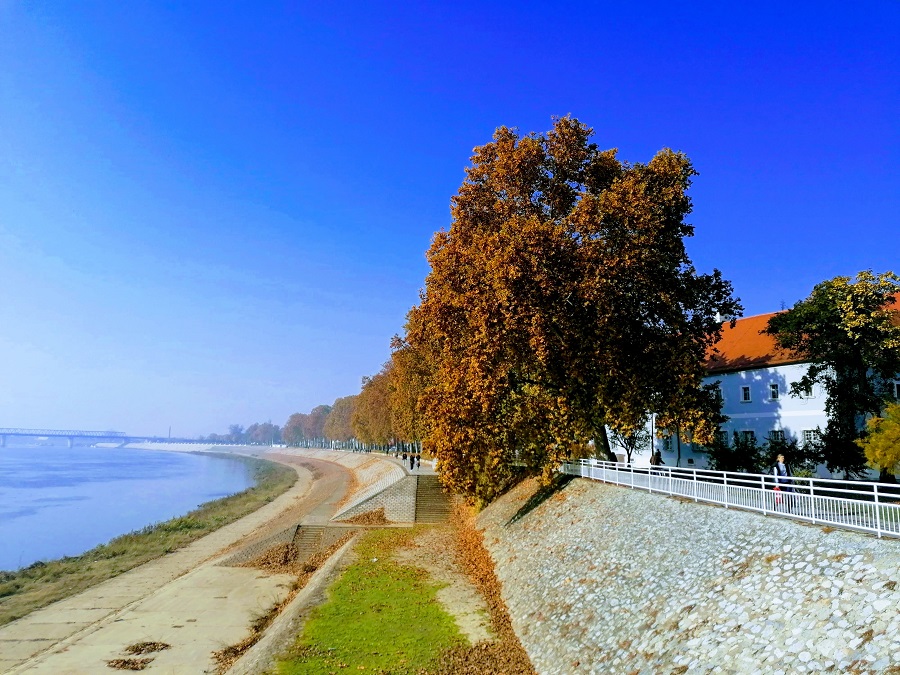
5. Think back to the time before you arrived. What were your perceptions about Croatia, and how were they different from the reality you encountered?
Life is not always greener on the other side. Once you make a permanent living in a place, it is not going to be the same as the one you remember from going on holiday. In my own experience, I have gained by this move that the freedom to do with my time what I like and not somebody else is the most valuable asset of mine. I have my free time on my hands, and I can do with it whatever I like. I could not dream about that in my previous life in London, where I knew my agenda months ahead, and most of my time I was spending just working.
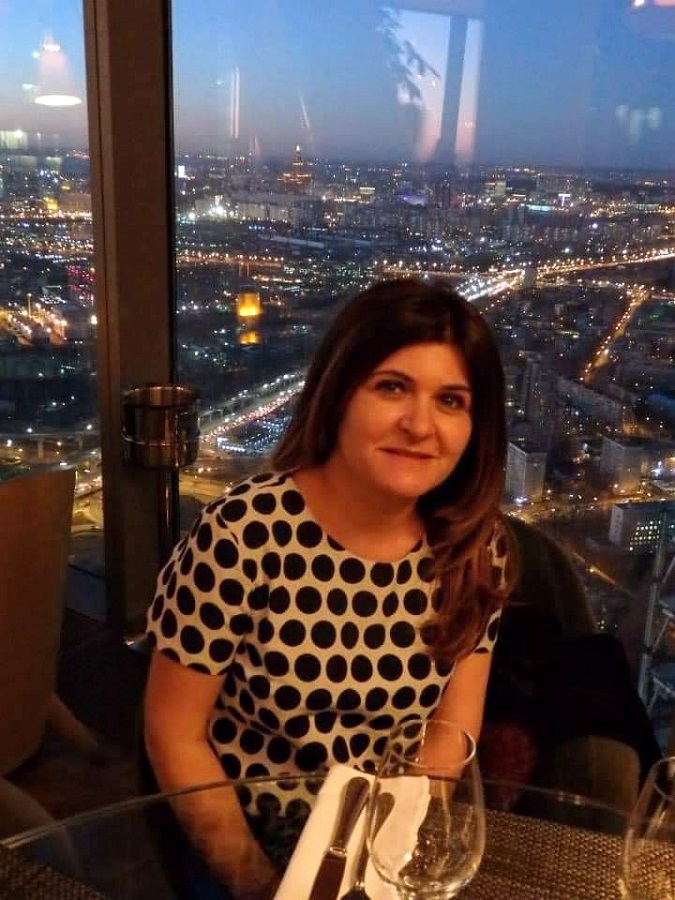
6. You are still here, so obviously, the pros outweigh the cons. Tell us about some of the things that you love about being in Croatia, as well as some of the things you don't like.
The best thing about my accidental return to Croatia is the more free time I have here. The pace of life is much slower here than in London. There's always the possibility to find time for a coffee with family and friends, personal interests and hobbies, or whatever your interests are. However, dealing with the unavoidable bureaucracy in Croatia is a tough matter, and that's an understatement. Be prepared to visit many government offices in order to get one single document. The same document in the UK you would get by simply pushing the button on your computer. Croats are not very good at respecting the rules of queuing. Getting in and out of public transport is very often a nightmare, and the best sample of that. Another thing that I hate in Zagreb is the rundown gray facades of beautiful former palaces mostly covered by ugly graffiti, which are actually nothing more than pure vandalism. Then permitted smoking in most coffee shops, widely spread corruption, poverty among a huge number of the population ... that's just to get me started.
7. What advice do you have for others thinking about making a move from the diaspora?
I would advise everybody considering the possibility of moving to Croatia to get informed as much as possible about the Croatian reality through different sources. They must be ready for a different lifestyle, habits, and mentality completely different from the one they have used to. Nothing is 100% perfect neither is everything so bad. There's no perfect recipe for success - everyone should have their own experience. Let them step out of their comfort zone with open eyes and open minds seeking the positive sides of Croatia. Let them enjoy new opportunities in life that Croatia offers.
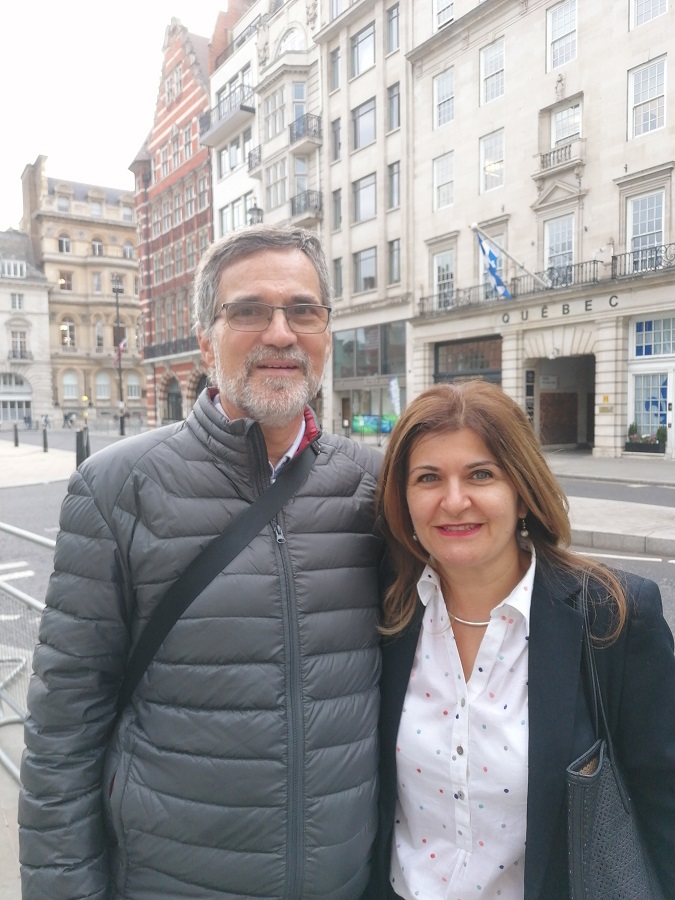
8. How do you think Croatia can better assist those who are looking to return to the Homeland?
It has to be the government's decision to support and stimulate people to settle in Croatia enforced by its real action giving them reasons why they should live in Croatia. They would help those willing to learn the language and integrate into society. They would make the bureaucratic procedures simpler; they would establish centers for language learning, give advice on how to find a place to live, etc.
A brilliant sample of individual initiatives opposite of slow government-run organizations is the project Digital Nomads, set up by Mr. Jan de Jong. What a wonderful project that made a huge difference in terms of the contribution of qualified foreign workers moving into Croatia.
****
Thanks, Zeljka, and good luck with https://www.britishcroatiansociety.com/
You can follow more stories in the Croatian Returnee Reflections series in our dedicated TCN section.
Would you like your returnee story - positive or negative - to be featured in this series? Contact This email address is being protected from spambots. You need JavaScript enabled to view it. Subject Returnee.
****
What's it like living in Croatia, and where can you get the best survival tips? TCN CEO Paul Bradbury and TCN Editor Lauren Simmonds have teamed up to publish Croatia, a Survival Kit for Foreigners.
Follow Paul Bradbury on LinkedIn.

Croatian Returnee Reflections: Mike Simundic, from British Columbia to Dalmatia
October 5, 2022 - Whisper it quietly, but more and more people are relocating to Croatia from the diaspora. In a new TCN series, we meet them to find out how they are faring and what advice they have for others thinking of making the switch. Next up is Mike Simundic from British Columbia, Canada to Dalmatia (Editor's note: being a Dalmatian, Mike is going slow with the full move, but has been building up to it with longer stays over the last two years).
My name is Mike (Marijan) Šimundić; I was born and raised in British Columbia, Canada, and am the son of Croatian emigrants. My work is in the technology sector, but my exact job is hard to explain; not even my parents fully understand what I do. The best explanation I've read so far is "Mike does mysterious things that nobody can fully understand. He just pushes a few buttons, makes a few phone calls, and bam, things get done".
As the son of Croatian emigrants from Split-Dalmatia County and as a foreign-born Croatian I have three parallel identities. I am a Croatian, a Dalmatian, and as my family is from a small village that is part of the Imotski area, I’m also an Imoćanin. From what I’ve seen and been told, there’s always someone from that area, and I’m fortunate to be among them.
My parents left during the SFRJ times to start a family in a more stable environment, which ended up being Canada, and I'm very grateful to my parents for making the choices they did so I could grow up to write this piece. However, I often wonder what my life would be like had I been born in and grew up in Croatia, if only for a little while. Fortunately, over the last 10 years, my affinity for Croatia has intensified, and I've experienced that intangible feeling of 'home' every time I visit, which I rarely feel anywhere else.
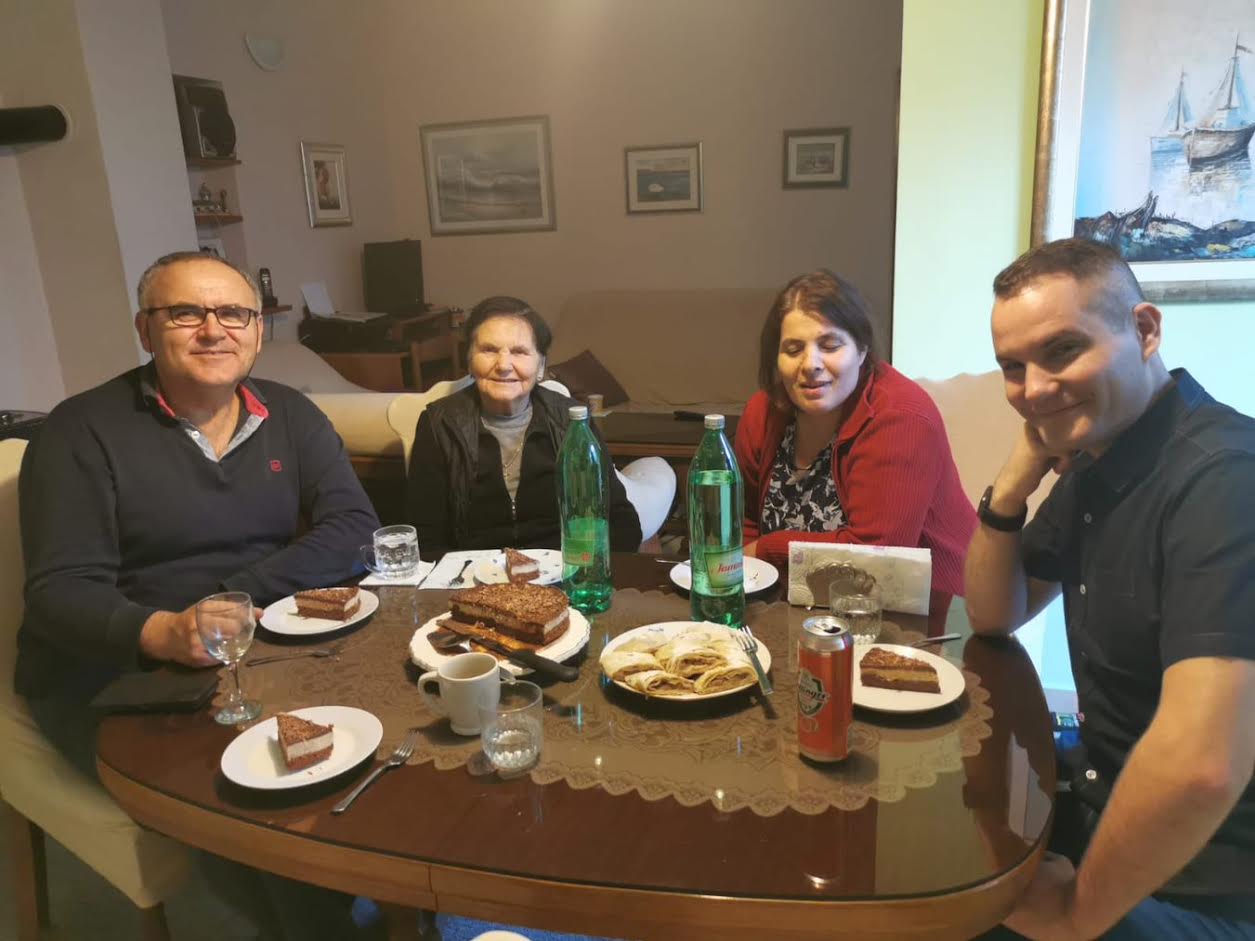
1. You made the switch to Croatia. Tell us a little about the decision process and how long it took for you to get on the plane.
Since 2012 I started having idle thoughts about making the move to Croatia as I slowly felt more like I was not where I belong. In 2012 I submitted my citizenship application as I saw potential with Croatia’s ascension to the EU and imagined what I could do with my life. During a work trip to Ottawa in 2013, I was able to visit the beautiful Croatian consulate thanks largely to a family friend Zvonimir Aničić, who is the Vice President of Croats Abroad, which is an advisory board for the Croatian Government. Serendipitously, while speaking to the Ambassador to Canada, one of the consular officers asked me to repeat my name as I introduced myself using my Croatian name to keep me thinking in Croatian. This time, I stated my legal name, and as if by magic, she produced my ‘rješenje’, and the few consular officials that were present congratulated me as from that moment on, I was a Croatian citizen. It was one of the happiest moments of my life.
Switching countries is no easy task. I'm a planner, and as a planner, I need to think through as many aspects of what I'm trying to do before making decisions that I cannot unmake. For context, what started as idle thoughts in 2012, turned into soul searching in 2020, and now in 2022, there is no alternative for me, only progression towards my goal. I've mostly figured out what options I have on where I can live vs. where I want to live, what jobs I can do vs. what jobs I want to do, etc., however, the part that I'm missing and still struggling with is finding a job in the technology industry in Croatia that is a fit for me. I'm not going to give up, as it’s a matter of time.
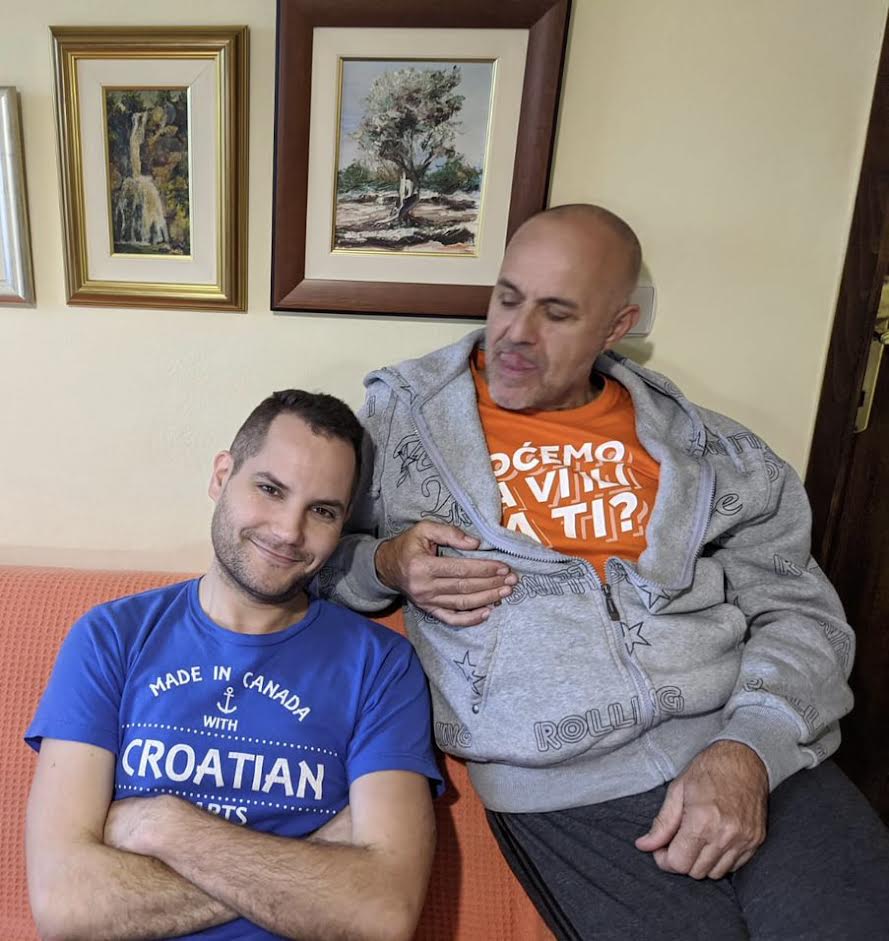
2. What did your family and community back home think of your decision at the time?
Generally speaking, my family in Canada and Croatia admire my tenacity to make my dream a reality. Although, I'm sure they quietly question why I would make such a move. It's unusual, but not uncommon for someone who was born and raised in a western country (with an Eastern European upbringing) to want to return home, where things won't be so easy and as a non-native speaker of the language, there will much I won't understand, but I'll have to learn. I've subconsciously regarded my trips to Croatia over the years as pilgrimages that I considered essential and nourishing, which collectively (re)built my very strong sense of 'home' as soon as I get off the plane in Zagreb or Split.
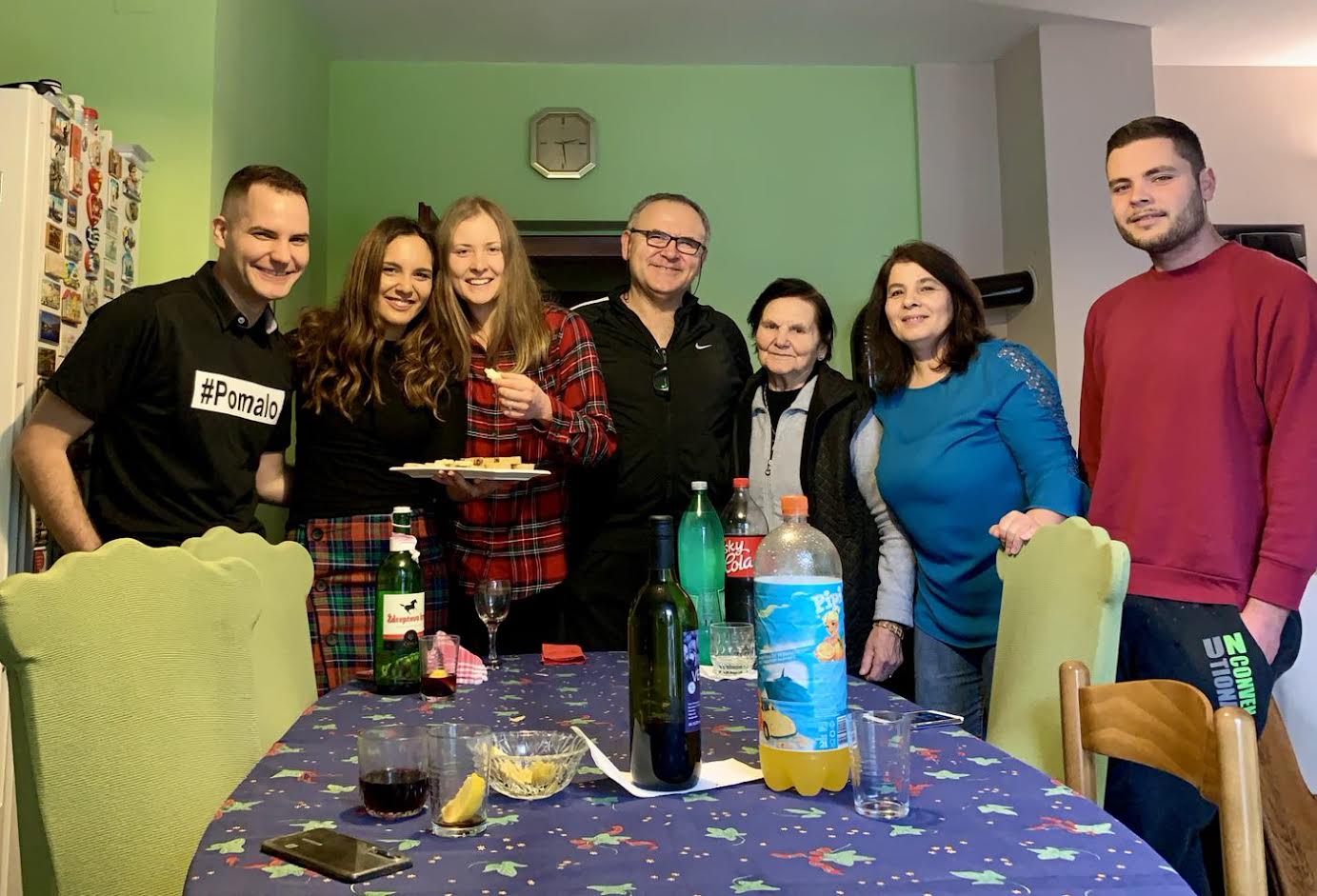
3. Where did you get your information about the realities of Croatia prior to coming?
I've been visiting Croatia on and off between 1994 and 2013, then more consistently since 2013 for vacations to see family and learn more about how things 'worked' in Croatia, and I always left feeling a little smarter. I was also fortunate to spend a total of 9 months over the last two years in Croatia, specifically in Split, which gave me lots of perspective on day-to-day life and allowed me to pretend to live in Croatia while tending to family matters. It wasn't easy as my work schedule went from 15:00 to 01:00 most days, sometimes later, to fulfill my commitments to my current company, which was kind enough to allow me to work internationally for a period of time I was in Croatia tending to family matters. Living in Croatia is more different than it is the same. However, I was impressed by some of the modernization of payments and services, especially through the e-Građani portal. However, I also learned that renting a flat was not straightforward, nor was it easy, and I was very fortunate during my last trip, that my aunt knew someone, that knew someone who had an empty apartment that fit my needs precisely, otherwise, I would not have been able to visit like I did. Proof that relationships are an essential part of daily life in Croatia.
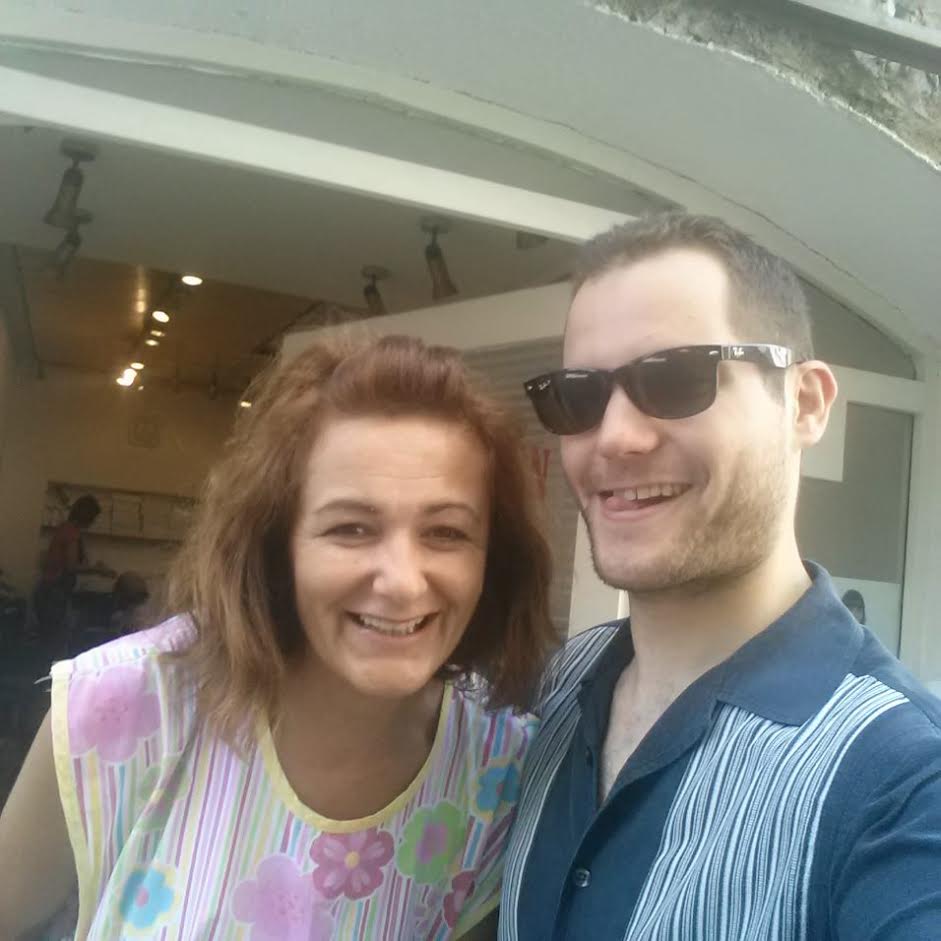
4. What were you most nervous about making the switch? What was your biggest fear, and what was the reality of what you found?
Starting over is never easy, and fortunately, I had to do that recently, so I have some experience. However, starting over in another country will be different. I've spent years and decades forming solid relationships with friends, professionals, and the like, which allowed me to have a solution/contact for any problem that came up. When I'm able to make the move, I'll have to start over again and seek out new friends (some of which I've already made, thankfully) and professionals to support me when I need help with something that is not in my 'wheelhouse'. I wouldn't say I have any fears about doing this, but I'm not excited about leaning on other people's connections when I need to as I prefer to make my own. However, to learn how to find the right people, you have to start with good people around you, and that's something I'm looking forward to. I will have to un-learn to be stubborn and do things the hard way and instead not be apprehensive about asking for help from others when they're more than willing to help you at a moment's notice.
5. Think back to the time before you arrived. What were your perceptions about Croatia, and how were they different from the reality you encountered?
When I first remember visiting Croatia as an adult, my knowledge of Croatian wasn't the greatest; I didn't know where I was going exactly, how I was getting there, etc. Someone came to pick me up, I stayed with family, didn't eat anywhere but with family, and was transported everywhere, which was nice but didn't give me much exposure to how things really were. This reality was rather jarring as my perception was based on spotty childhood memories in the village, and I didn't know exactly how everything worked and how different it was from Canada. After getting some exposure, staying on my own when visiting, and improving the language skills I learned: always bring cash, don't just nod your head and pretend to understand what people are saying, and always assume the people you're talking to know something you don't.
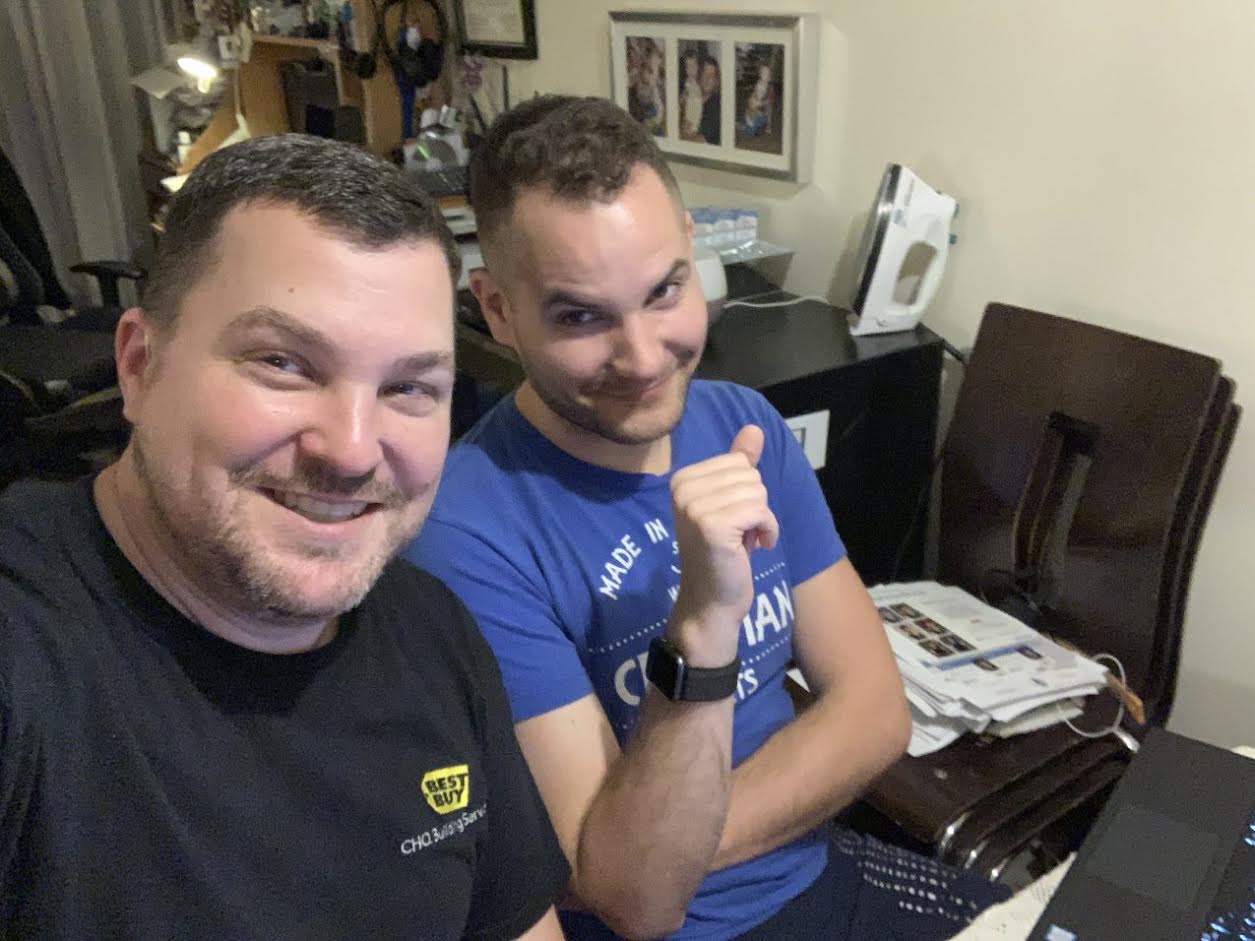
6. You are still here, so obviously, the pros outweigh the cons. Tell us about some of the things that you love about being in Croatia, as well as some of the things you don't like.
Things I love about Croatia:
- The food
- Bura
- Other Croatians
Things that don't excite me about Croatia
- Tourist season because of the crowds and crazy prices
- Always having to carry cash
- Showering in a bathtub
7. What advice do you have for others thinking about making a move from the diaspora?
Try not to overthink it and talk yourself out of doing it. Pretend like it's your only option and really consider all options with the guiding principle of 'what do I want vs. what can I live with'. It won't be perfect; it's not meant to be. You'll need to learn to do more with less, but in the long run, it'll teach you to be more minimalistic, which I don't think is a bad thing. There are lots of groups on different platforms that contain tons of helpful people that want to help. Join these groups and use them to plan your departure from your current country, and I promise you'll meet some great people who may even turn into close friends. Don't downplay the value of learning the language if you're like a native English speaker and me. You'll likely speak Croatian with an accent, but don't let that discourage you. Persevere, and you will enjoy the pleasure of speaking the language which you can use to help yourself and others.
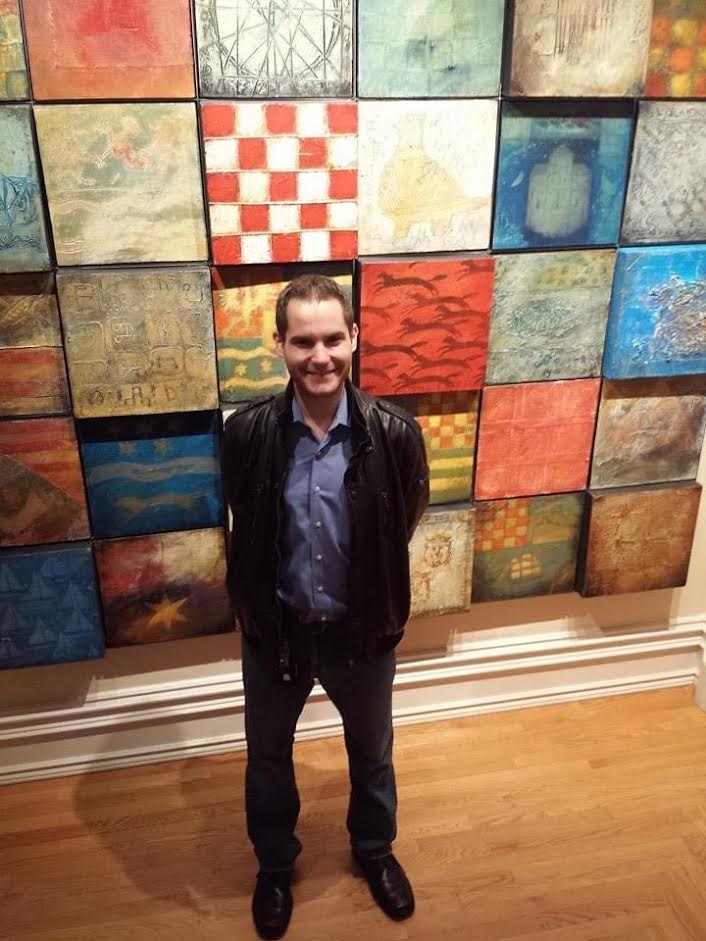
8. How do you think Croatia can better assist those who are looking to return to the Homeland?
Generally, I think Croatia is doing ok in assisting those who are looking to return home. I would personally like to see the citizenship verification process sped up through the consulates if at all possible and continue to digitize processes and procedures both domestically and abroad. More language options for non-native speakers through consulates or options at universities in the major cities would likely be warmly welcomed as well. I personally would attend these to strengthen my foundational knowledge and unlearn certain words like 'fonat' and 'povakumat', which everyone gets a good laugh over when I accidentally use in a sentence. Finally, job placement/opportunities are an area in which I would love to see some improvement, selfishly, however, I know there can't be an improvement if there are minimal job openings in the first place. Perhaps more incentives for companies to open up shop in Croatia would stimulate job postings and in turn, applicants, or a cultural shift in how jobs are posted and salary transparency. Times are tough all over, and knowing if you can afford to apply for and be accepted to a job in advance is becoming crucial in people's job searches, especially with the rising prices of the basics in Croatia.
****
Thanks, Mike!
You can follow more stories in the Croatian Returnee Reflections series in our dedicated TCN section.
Would you like your returnee story - positive or negative - to be featured in this series? Contact This email address is being protected from spambots. You need JavaScript enabled to view it. Subject Returnee.
****
What's it like living in Croatia, and where can you get the best survival tips? TCN CEO Paul Bradbury and TCN Editor Lauren Simmonds have teamed up to publish Croatia, a Survival Kit for Foreigners.
Follow Paul Bradbury on LinkedIn.

Croatian Returnee Reflections: Phil Vrankovich, from California to Hvar
October 4, 2022 - Whisper it quietly, but more and more people are relocating to Croatia from the diaspora. In a new TCN series, we meet them to find out how they are faring and what advice they have for others thinking of making the switch. Next up is Phil Vrankovich, who moved from California to Hvar.
My name is Philip Vrankovich, and I am presently retired after 30 years in the IT side of the energy business. I was born in Oakland, California. My connection to Croatia is through my paternal grandparents, Antun Vranković and Bona Dobrosić, both from the village of Svirće on the island of Hvar. They immigrated to America at the turn of the 1900s.
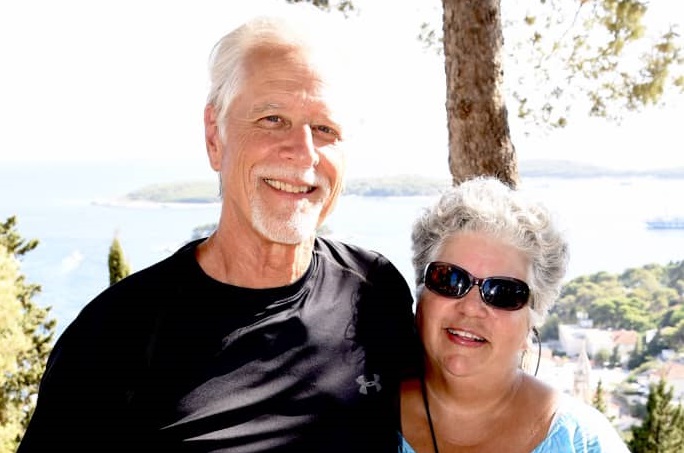
1. You made the switch to Croatia. Tell us a little about the decision process and how long it took for you to get on the plane.
I had always talked about going to Croatia, starting in the 1980s, but didn’t actually make it there until 2000. In July, 2000, we made a family trip to Hvar to meet family members I had only heard about. We arrived at the Stari Grad port to our cousins waving Croatian and American flags in the parking lot. It still gives me chills recalling that experience. My wife, Vicki, and I returned in 2001 to purchase property in Vrboska, with the intent of retiring on the island. In 2006, we made that dream come true, when we purchased a house in the now UNESCO-protected town of Stari Grad. I also became a Croatian citizen in 2010. We’ve made Hvar our home for 6 months out of the year, spending the rest of the time in California and now Connecticut.
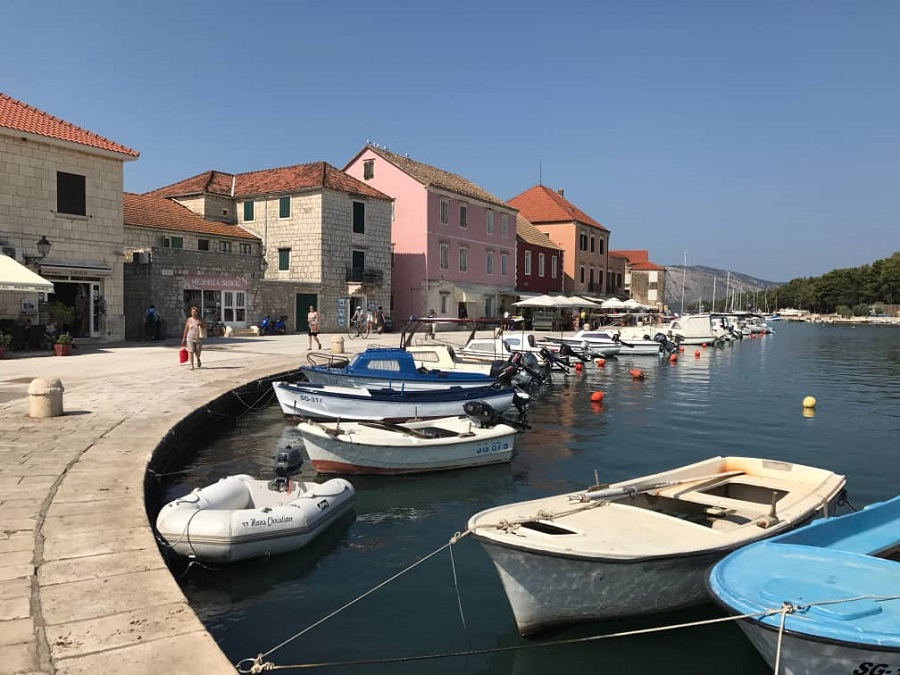
2. What did your family and community back home think of your decision at the time?
Family and friends have been very supportive of our decision to make Hvar our second home, and of course, many have come to visit over the years.
3. Where did you get your information about the realities of Croatia prior to coming?
Since I had family who came from Dalmatia, I had resources in America who helped to tell us about what to expect; however, that was no replacement for actually being here - in reality, it was so much more beautiful than I had imagined!
My godmother and her two daughters helped us arrange to meet family members, as well as their families, on our first trip in July 2000.
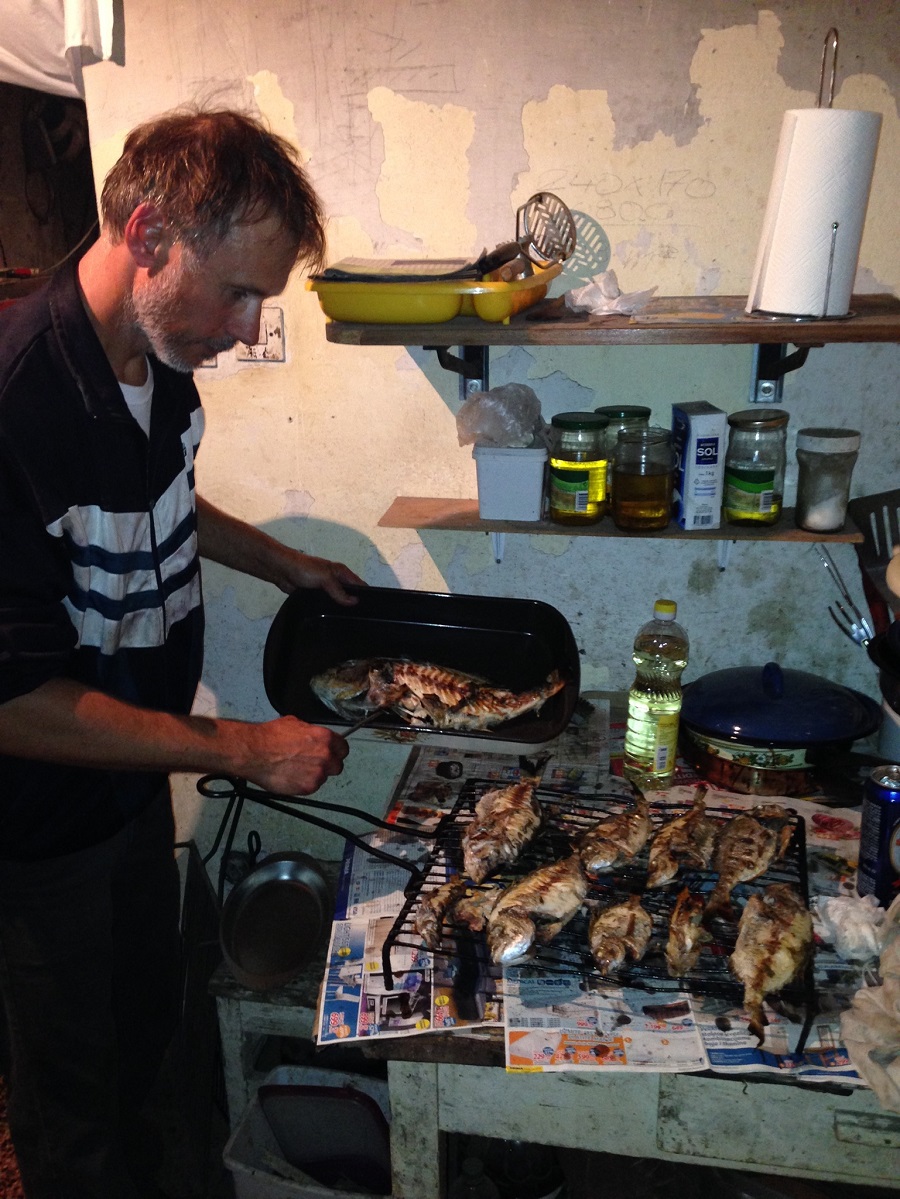
4. What were you most nervous about making the switch? What was your biggest fear, and what was the reality of what you found?
Really, we had no reservations about making a switch to living on Hvar. We had family here, made some friends, both domestic and expatriate, and felt welcomed. Initially, I thought the language difference would be an issue, but we found many people spoke English and those that didn’t, we were able to use our limited Hrvatski, sign language and pantomime in order to communicate
5. Think back to the time before you arrived. What were your perceptions about Croatia, and how were they different from the reality you encountered?
My parents and sister visited Hvar in the mid-1970s, and of course, it was much more primitive then. I remember my father saying there was no air conditioning, few autos and that you couldn’t get ice at a bar. He questioned why we would want to live there… of course, when we arrived, it was decades later, and things had changed here. I recall asking, “why did my grandparents ever leave, this place is so beautiful!” However, life in the late 1800s was very different here. When they married, it was two brothers who married 2 sisters, and there were not enough resources for both pairs to stay there. So my grandparents made the move to America.
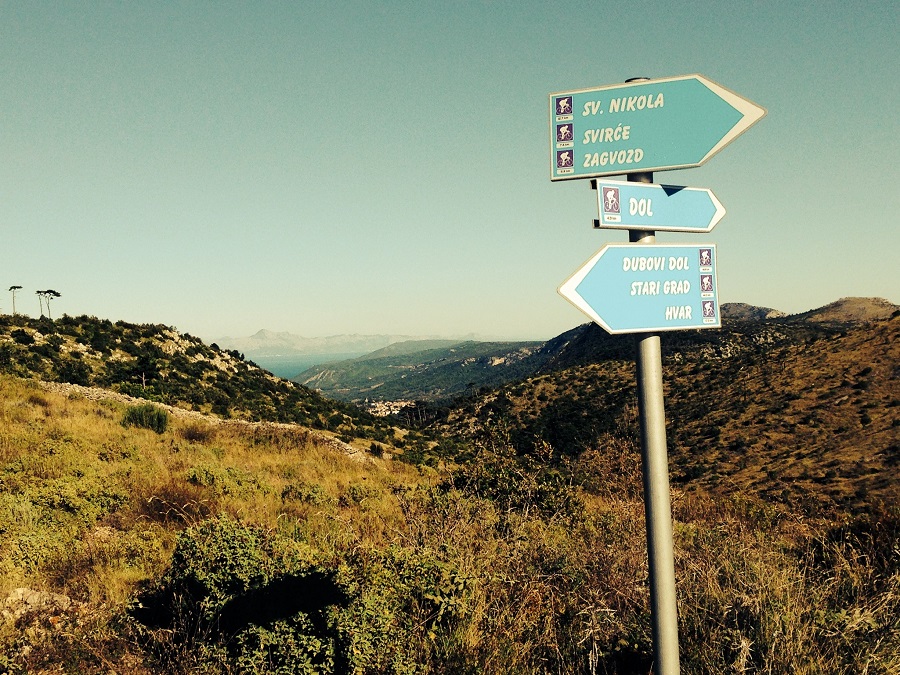
6. You are still here, so obviously, the pros outweigh the cons. Tell us about some of the things that you love about being in Croatia, as well as some of the things you don't like.
We love the island life, “polako,” the family and friends we have met here, and of course, the culture, food, history, and environment (sea, mountains, and the climate). It’s difficult to put into words the feeling of visiting the house my grandmother was born in or planting grape vines in a field where my great-grandfather once toiled… it’s very special!
For the cons, the bureaucracy of getting anything done here is frustrating, and trying to learn Hrvatski is difficult (grandmother and father always spoke to me in English… I guess they never conceived any of us ever going back), especially with so many people here speaking English, and missing immediate family and the variety of food available back in America.
7. What advice do you have for others thinking about making a move from the diaspora?
Follow your dreams! Visit, and live in one place for a period of time to experience the community. See if it really fits your lifestyle. Don’t be disappointed and frustrated when things don’t turn out exactly as you expected, instead embrace the differences and go with the flow.
8. How do you think Croatia can better assist those who are looking to return to the Homeland?
Make becoming a Croatian citizen a streamlined process, and afford all family members of returning Croatians the same level of respect under the law. For example, during Covid, my Croatian passport expired in 2020, and my wife’s residency card expired in 2021, yet they allowed me to renew my passport but told her she must start the entire process all over again! Why is it that my wife can’t become a citizen simply by the fact that she is married to a Croatian? Instead, she must go through the process of being a temporary resident for many years.
****
Thanks, Phil!
You can follow more stories in the Croatian Returnee Reflections series in our dedicated TCN section.
Would you like your returnee story - positive or negative - to be featured in this series? Contact This email address is being protected from spambots. You need JavaScript enabled to view it. Subject Returnee.
****
What's it like living in Croatia, and where can you get the best survival tips? TCN CEO Paul Bradbury and TCN Editor Lauren Simmonds have teamed up to publish Croatia, a Survival Kit for Foreigners.
Follow Paul Bradbury on LinkedIn.

Croatian Returnee Reflections: Katarina Bucic, from Toronto to Zadar
October 3, 2022 - Whisper it quietly, but more and more people are relocating to Croatia from the diaspora. In a new TCN series, we meet them to find out how they are faring and what advice they have for others thinking of making the switch. Next up is Katarina Bucic, who moved from Toronto to Zadar.
My name is Katarina Bučić; I was born and raised in the Greater Toronto Area. I lived in Canada with my parents, who moved to Toronto 30+ years ago from Posušje, Hercegovina, and my 4 brothers for 27 years. I worked as a Registered Massage Therapist in the city and was starting to grow tired of its fast-paced and high-stress energy. After I got married to my husband Josip Bučić in 2016, we decided to move out of the city to slow down life a bit and take our first trip to Croatia together as a married couple, my first time visiting in 12 years. I was so eager to revisit my family and soak in my heritage as I was always raised to be a proud Croatian in a multicultural country and to be connected to my roots.
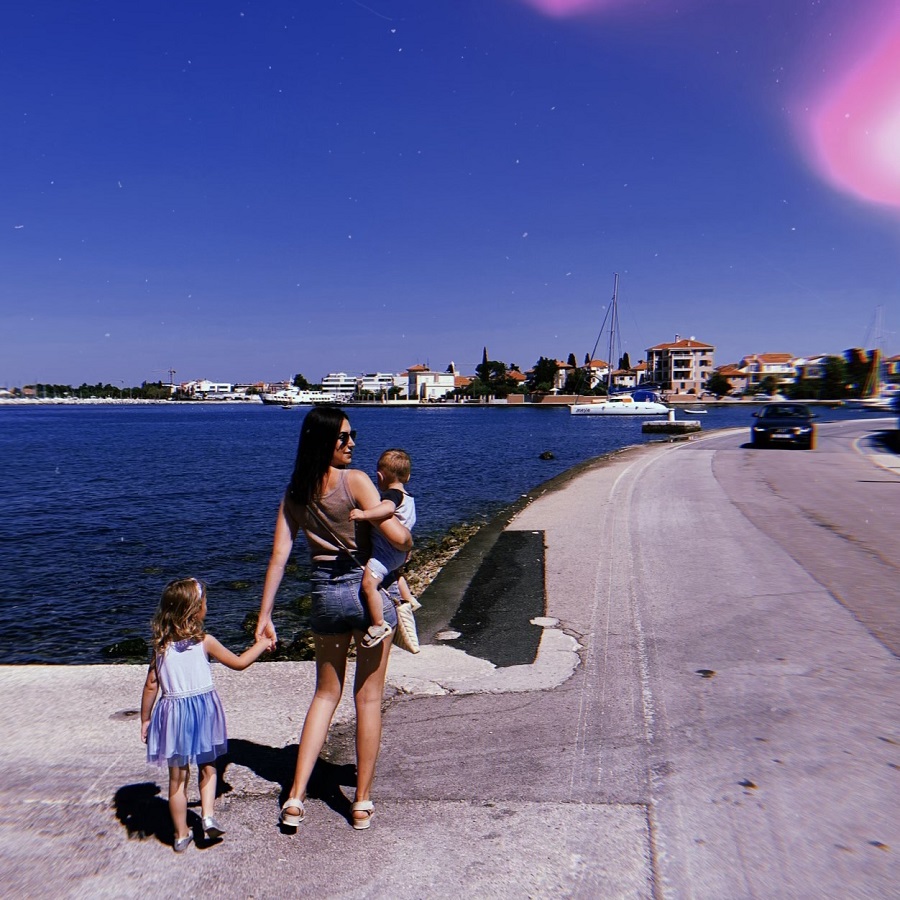
1. You made the switch to Croatia. Tell us a little about the decision process and how long it took for you to get on the plane.
The summer vacation my husband and I took together in 2017 was the catalyst for us returning to Croatia one day. My husband's family is from Zadar, and so we spent most of our time there. It did not take me long to fall head over heels in love with Zadar as a city! The beauty, the ancient walls, and the cobblestone streets. The beaches, the sunrises, and the sunsets on the water. The fresh air, fresh food, and moments are created around the dinner table. The slow pace, the laid-back attitude, and the social culture. I can go on for ages about the magic I felt that summer. The entire trip, my husband and I spoke about the Croatian lifestyle and how different it was from our lives back in Canada. We fell in love with Zadar so much that I said if I were ever to have a daughter, we would name her Zara.
When we arrived back in Canada, we both fell into a sort of funk. We really tried to hold onto the energy and vibe of Croatia once we returned to Canada, but it just wasn’t the same. For years following that trip we talked about our dream of moving back to Croatia someday. There were many game plans, pros and cons lists, and bouncing ideas off of our family and friends. Many people didn’t think too much of our conversations because they always assumed it was just a ” one-day” type of dream, but they didn’t know how we felt that summer in Croatia and how we craved that feeling ever since we left. One evening during pillow talk with my husband Josip, having our 1000th conversation about dreaming to move to Croatia, I had finally had enough. ”You know what?! I am tired of talking about this over and over again. Are we going to do this or what?! Let’s decide right now, you and I, should we chase this dream of ours?” Josip looked over at me with a big smile and said,” Let’s do it!!!”. The next day when he returned from work, I said,” Guess what, babe? I bought us one-way tickets. We are moving to Croatia in 2 weeks.” He nearly fell to the floor. Just like that, Josip, my daughter Zara and I were heading on a new adventure!
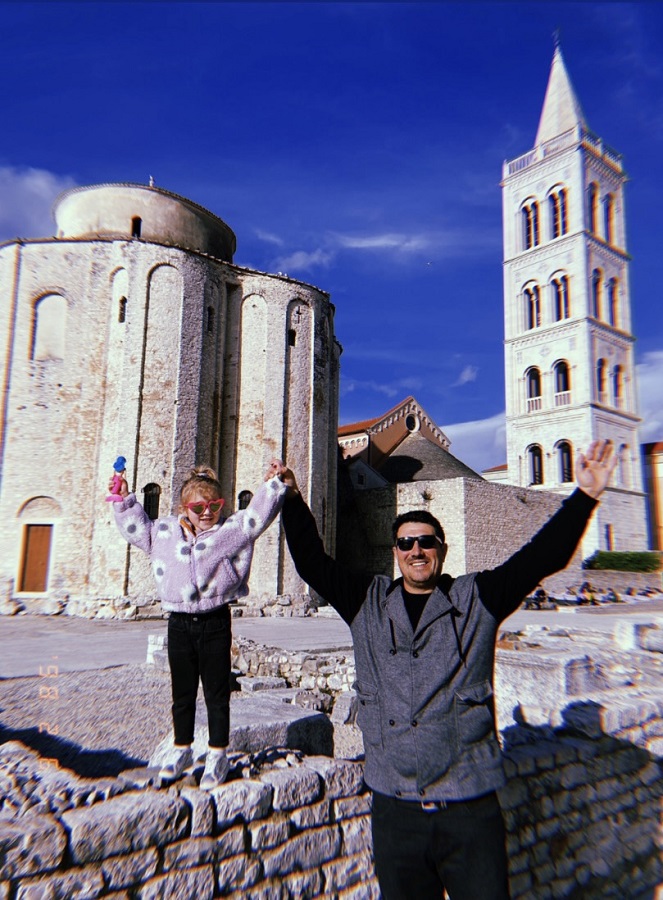
2. What did your family and community back home think of your decision at the time?
As I had mentioned earlier, our family and friends have heard us dream about moving back for years, but I don’t think anyone thought we would actually do it. Once everyone found out that we had actually purchased one-way tickets, the support had an undertone of sadness. Some people thought what we were doing was the most exciting and inspiring act, others thought we were complete morons and doomed, and those closest to us we so happy for us but sad that we were leaving. In all honesty, I feel like many of our friends in the Croatian community have always dreamt about moving back but had self-limiting beliefs. I think they were hoping for us to fail so that they could reassure themselves that their dream is not attainable. It was quite discouraging to hear comments like ”I’ll see you back here in a year” or ”What are you going to do over there? You know there is no work, right? Even if you find work, nobody will pay you reliably” and the most popular from the women ”You know they treat women poorly there right? Josip will change, and your marriage will suffer”.
3. Where did you get your information about the realities of Croatia prior to coming?
I supposed we did not do too much research. We did not know any people close to us who have made a move as well, so we didn’t have anyone to ask for their personal experiences. We knew that we would be applying for residency and citizenship upon arrival, so we came prepared with all of our Canadian documents and had them certified and translated. The rest of our perception of reality in Croatia was based on our summer there in 2017. Josip and I were on the same page about what we wanted out of life and what we wanted our lifestyle to look like, and we were both sure that Croatia could provide that for us.
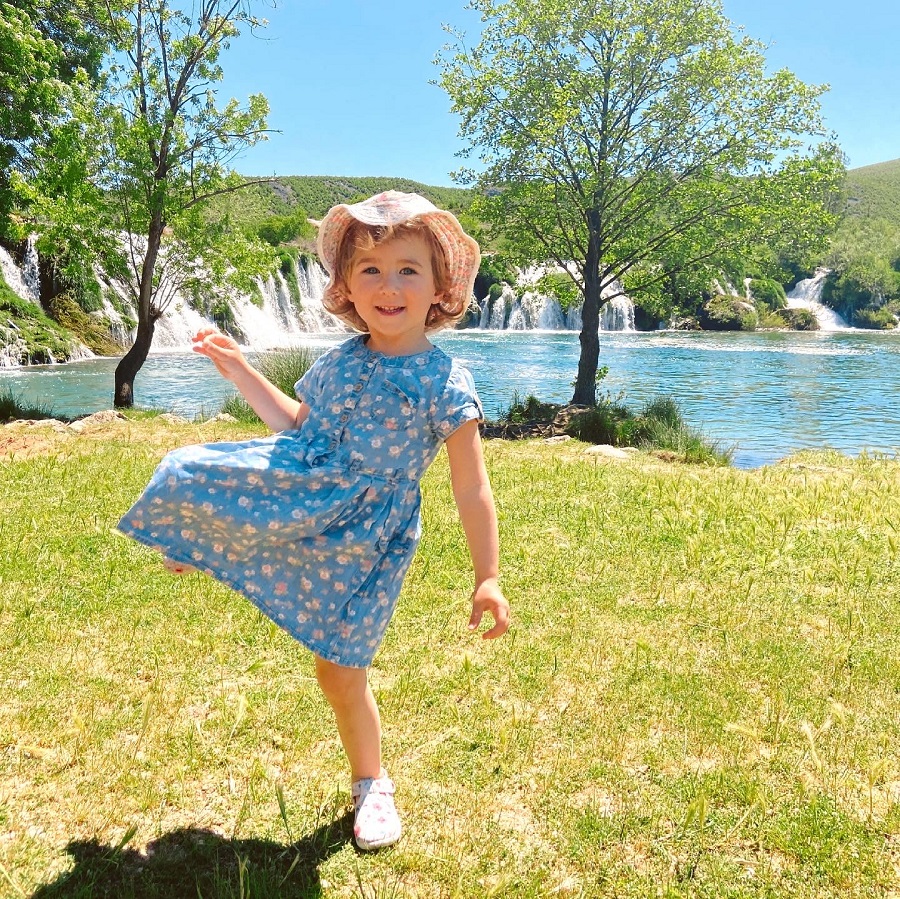
4. What were you most nervous about making the switch? What was your biggest fear, and what was the reality of what you found?
We made a move so quickly that it didn’t leave us much time to worry, but rather get things done! As a lovely add-on to the major life change we were about to encounter, 4 days before we left, I found out I was pregnant with my second child, surprise! I immediately began worrying about obtaining health care and what the hospitals are like in Croatia, and what my birthing experience would be like. After arriving in Croatia, I realized that my fear would soon become a reality. When I think about the bureaucracy here and having to get any sort of government paperwork done, the first word that comes to mind is NIGHTMARE. As I continue to meet other expats and even locals, I would say that is easily the biggest problem in Croatia. I cannot tell you how many times I stood in line pregnant and holding Zara for 3+ hours only to be told that they can’t help me and that some completely random and illogical paperwork or process was missing. I had so much anxiety every time I walked into a government building because I never knew what I would hear. That I missed a step in the process and can be issued a fine, that they will kick me out of the country if I don’t get my papers sorted before the deadline, or that I will not obtain public health care before I go into labor with my son. I quickly learned that Croatia is a very ”it’s all about who you know” kind of place. I got practically nowhere to obtain residency and health care on my own. Luckily my husband has many aunts, uncles, and cousins here that were willing to help. They showed up to the meetings with me, spoke on my behalf, showered the government workers with homemade olive oil and chocolates, name-dropped a few people, and VOILA, I was finally getting somewhere. As grateful I was to have those connections and finally have some progress, I was utterly shocked that this is how the system operated and felt deeply sad for the people moving here who didn’t have those connections.
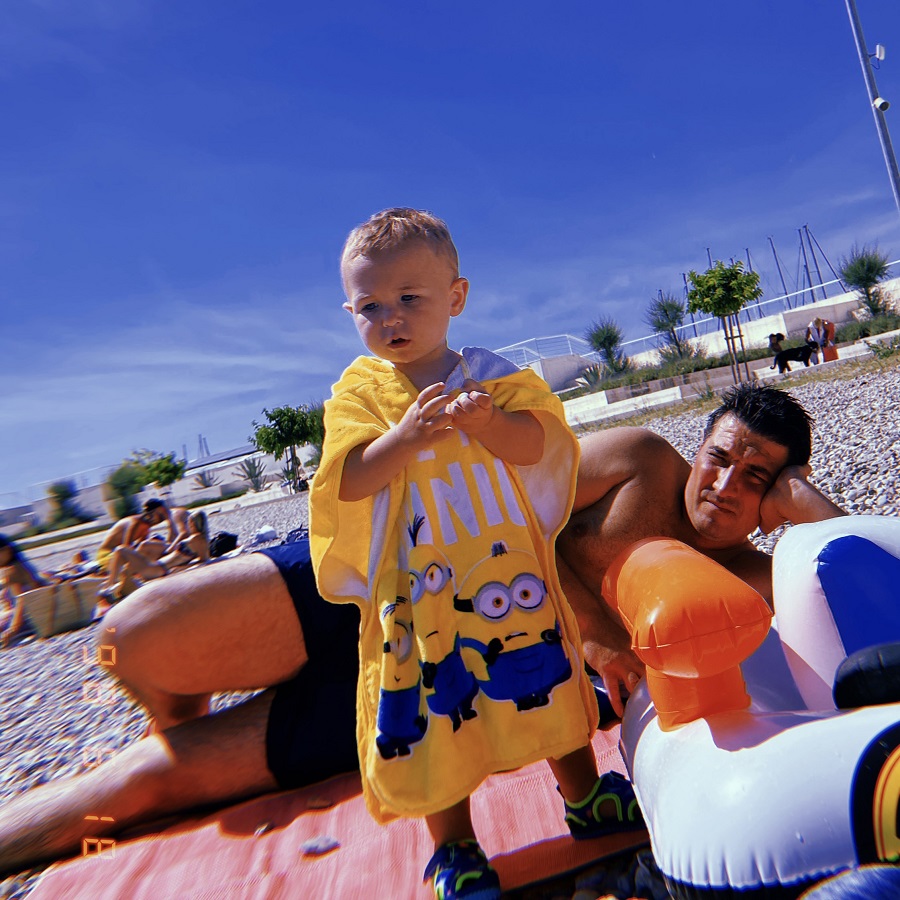
5. Think back to the time before you arrived. What were your perceptions about Croatia, and how were they different from the reality you encountered?
Naively, I had the perception that our return to the motherland would be celebrated by the locals. With the economy in Croatia suffering and many young people choosing to live and work elsewhere, I thought our young family coming to lay roots and contribute to Croatia would have been embraced. I must say there were some wonderful locals who were very proud of us, but the overall judgment, resentment, and outright mocking from the locals really shocked me. Just like many of the people back home, there were Croatian locals who were also laughing about us failing and returning home with our tails between our legs. Luckily for us, we have that stubborn Croatian blood and used that stubbornness to propel us into creating the reality we dreamed of!
6. You are still here, so obviously, the pros outweigh the cons. Tell us about some of the things that you love about being in Croatia, as well as some of the things you don't like.
The people of Croatia, just like the rest of the world, have been sold the ”American dream”. When they scratch their heads in question about why we would leave the ”land of opportunity” to move to a poor economic country, I would reassure them that their perception of North America is warped. Do not get me wrong; I am so grateful I was raised in Canada and was exposed to such an open-minded and multicultural environment. Although the Canada my parents moved to in the 80s and the Canada I lived in before leaving were two very different places. Josip and I grew tired of the 4 hours on the road everyday commuting, on dangerous winter roads, I might add, the ”it's never enough” greed that was sweeping our culture, the constant arguing over religion and politics, the unhealthy lifestyles we were leading, and the lack of social life. I was starting to feel ourselves, along with everyone else around us, turn into robots. We only had time for work, sleep, and repetition, and there was no spontaneity left in our lives. Paying your bills and keeping up with the Jones’ was taking over like a plague, and we were sick of it! Since moving to Croatia, our days feel longer, our lives sunnier, and our future brighter. They say Zadar has 300 sunny days a year, and that is exactly how I would describe our life here, sunny! Fewer hours a day spent in Toronto traffic means more time to cook a fresh homemade dinner, stop by a neighbor's house for a coffee, or our nightly walks through the stunning city of Zadar. People are so much more at the moment here; they smell the air, notice the wind, and indulge in the people in front of them. I have yet to be with someone and have them have their face on their cell phone or be in a daze worrying about work the next day. The magic of living in the moment is so evident here and is truly what Josip and I value the most.
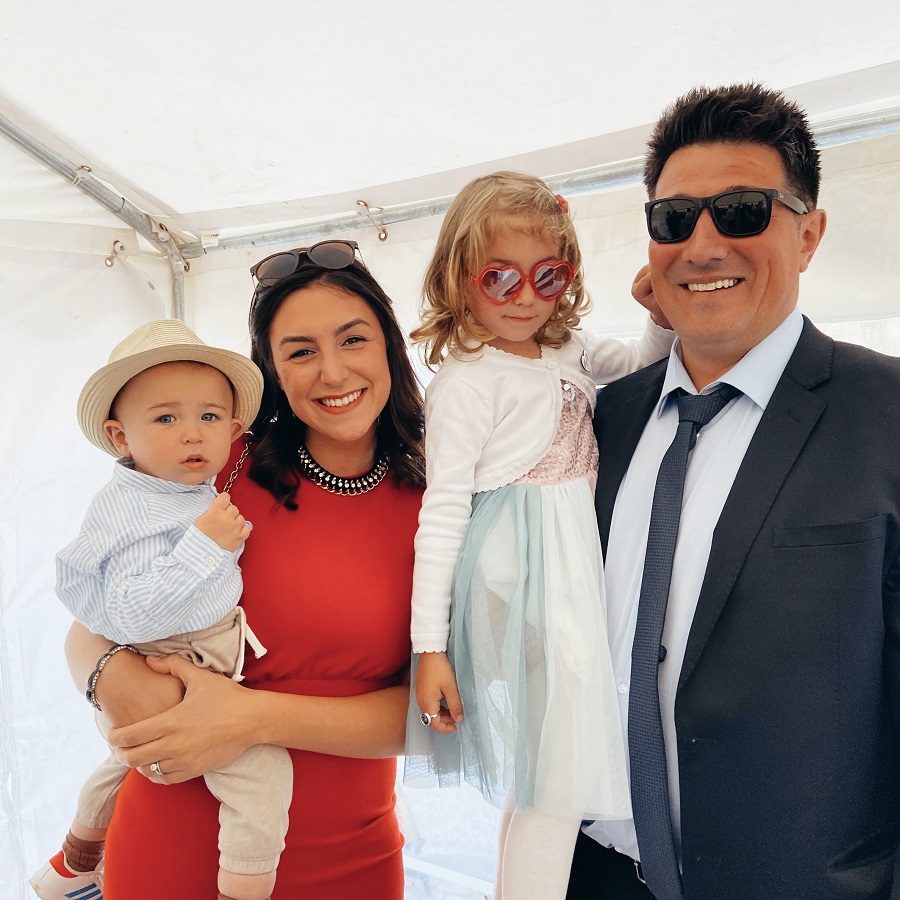
7. What advice do you have for others thinking about making a move from the diaspora?
I would first like to say that I believe true happiness comes from within. Whether where you are is ”heaven” or ”hell” is all based on your perception. If you have an open mind, a determined spirit, and a passion and love for Croatia, you can do it! There is a massive expat community here that is beyond welcoming and helpful and is a great support system for one another. Our dream of moving here was nagging at us for years, and finally answering the call for change has been the best decision we have ever made for our family. If you are seriously thinking of moving to Croatia, then there is clearly something pulling you to shake up your life a bit! There will definitely be moments where you might, in fact, feeling shaken. I have had moments of frustration and have felt homesick. In those moments, my husband, my children, and I go for a walk in Zadar, watching the most beautiful sunset in the world while the sea organs play and laughter and a sense of calm fill the air, and I immediately feel at peace again. My perception of my life in Croatia with my family is truly my idea of ”heaven on earth”.
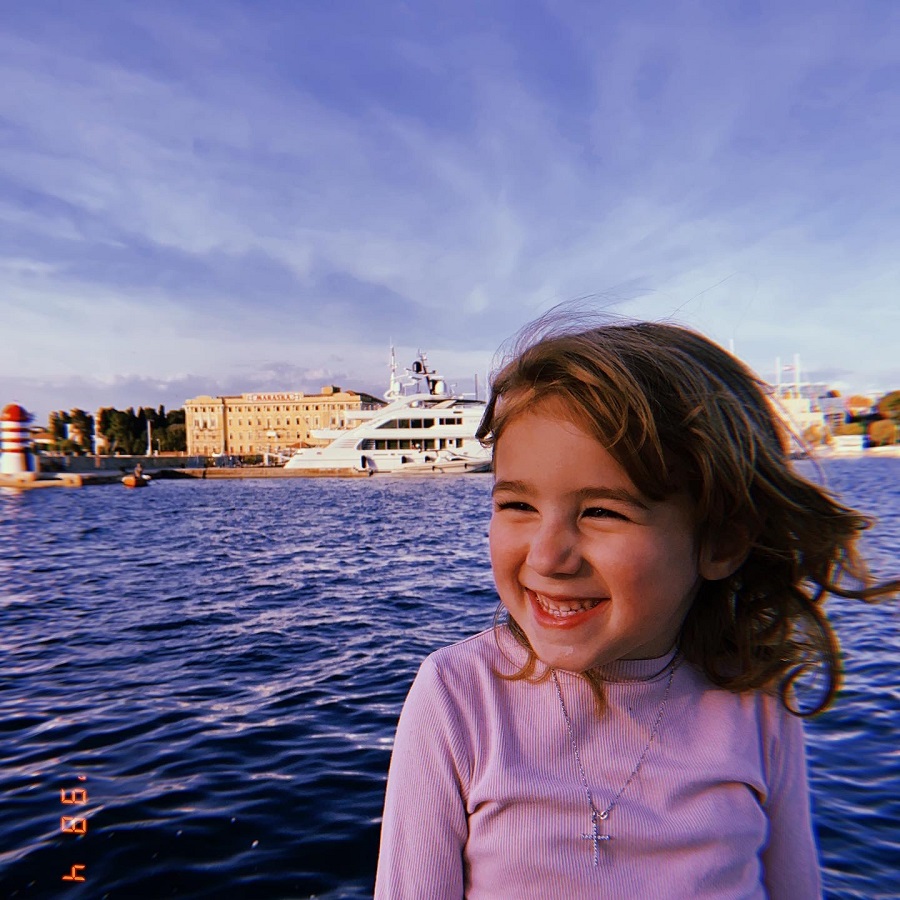
8. How do you think Croatia can better assist those who are looking to return to the Homeland?
People all around the world are discovering Croatia and understanding its beauty and the appeal of living here. I have no doubt that the expat community will continue to grow rapidly, and I would love to see them be more embraced here. The problem with the bureaucracy is not one I know how to fix, but it is by far the biggest hurdle people encounter when moving here. Perhaps more information and English-speaking assistance for newcomers would be a good start. As for the tainted mind of the locals and their hesitancy towards expats, I wish for them to understand that we love their country so much that we decided to give everything up to live there! I would love for them to receive us as a compliment and not as a threat. Croatia is a growing and quickly evolving country. I think we can find the balance of respecting its untouched and rooted energy while accepting the open-minded and positive energy we expats bring. Croatia is abundant, and there is enough of her beauty to sustain us all.
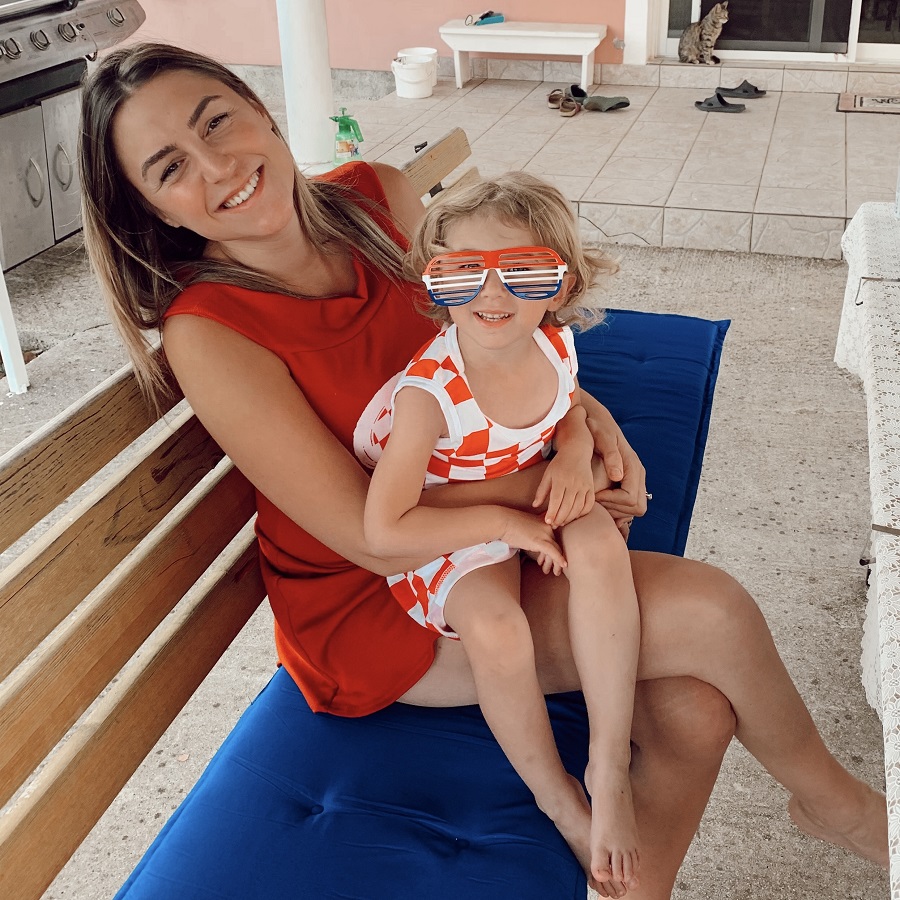
The sun is hot on our faces,
our skin becoming kissed.
The sound of birds, dogs and children,
I pinch myself to be sure I exist.
A woman is singing,
she plucks the strings of her guitar.
The old man in the hat watches her
as he smokes his cigar.
These walls have history,
many tales of victories and defeat.
My daughter dances on its ruins,
my son explores the cobblestone in his bare feet.
A castle that was fit for kings and queens
is surely fit for you and me.
Zadar as the backdrop of our story,
the cleansing from the deep blue sea.
My heart belongs to this city,
my family breathes its air.
I wouldn’t have it any other way,
God has answered my prayer.
- Katarina Bučić
****
Thanks, Katarina!
You can follow more stories in the Croatian Returnee Reflections series in our dedicated TCN section.
Would you like your returnee story - positive or negative - to be featured in this series? Contact This email address is being protected from spambots. You need JavaScript enabled to view it. Subject Returnee.
****
What's it like living in Croatia, and where can you get the best survival tips? TCN CEO Paul Bradbury and TCN Editor Lauren Simmonds have teamed up to publish Croatia, a Survival Kit for Foreigners.
Follow Paul Bradbury on LinkedIn.

Croatian Returnee Reflections: Andrian Juric, from Sydney to Zagreb
October 1, 2022 - Whisper it quietly, but more and more people are relocating to Croatia from the diaspora. In a new TCN series, we meet them to find out how they are faring and what advice they have for others thinking of making the switch. Next up is Andrian Juric, who moved from Sydney to Zagreb.
My family is from Škabrnja, a town known for its agriculture and classic Dalmatian attitude; you know the one: slow to anger, reasonable in debates, respectful of road rules, and a healthy dose of sarcasm. I was born in Sydney, Australia, and like my father before me, I left the country of my birth for a better life. I've been living in Croatia since the World Cup of 2018. I live in Zagreb, where I work for OptimoRoute, a Silicon Valley software company. If you live in a major English-speaking city and ordered something online, chances are you are indirectly using our software.
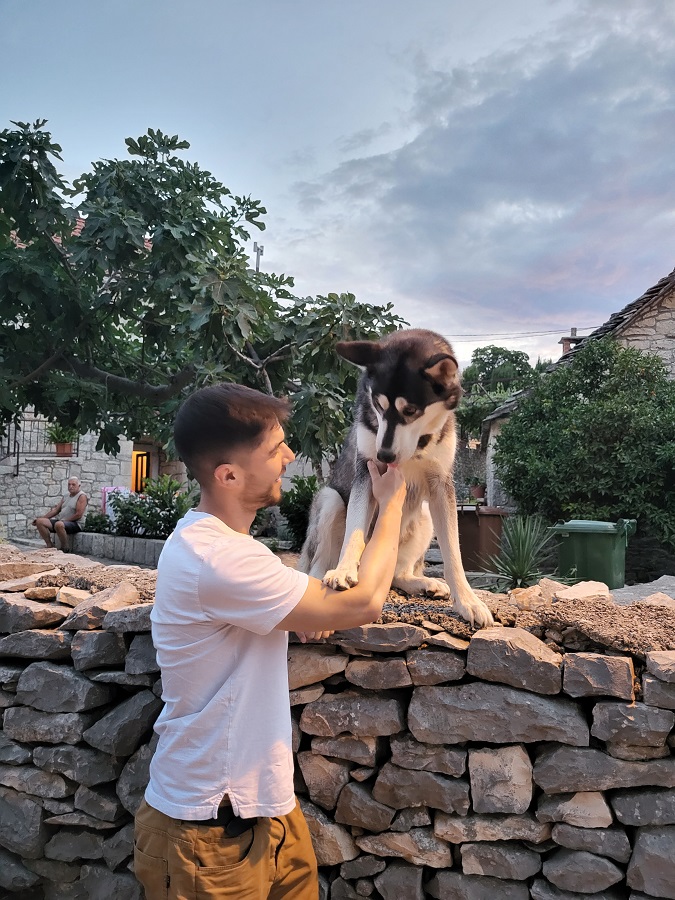
1. You made the switch to Croatia. Tell us a little about the decision process and how long it took for you to get on the plane.
Back in 2012, I visited my godparents in the town of Nin. After an amazing home-cooked meal (My godmother reads this, this will make her day), my godbrother and I enjoyed a night of partying with the locals. Eventually, we ended up listening to a live band playing acoustic versions of Dalmatian hits. His family was all there, late into the night, at a bar that overlooked the beaches of Nin, and all I could think was, "This is a Tuesday for them"
It was then that I realized that his family has something no one in Sydney will ever have. If they could have this life, why couldn't I do the same?
I then started looking for other returnees to Croatia who came from Australia. The ones with the best lives were all working remotely for Australian companies. An Australian salary with a Croatian cost of living was the dream. I spent 2 years learning relevant skills, built up a network of contacts in Sydney for remote work, and made this dream a reality.
The Russian World Cup in 2018 was the perfect opportunity to visit Croatia. I saved up a lot of vacation time and left on a reconnaissance trip. In-between matches, I looked up rental properties, interviewed with local tech companies, networking with business owners, everything that I would need to thrive. It was a crash course in living in Croatia.
Not many people have that moment where they know exactly where they need to be. I had this in 2018. I didn't want to be anywhere else, and I'd do whatever it took to stay.
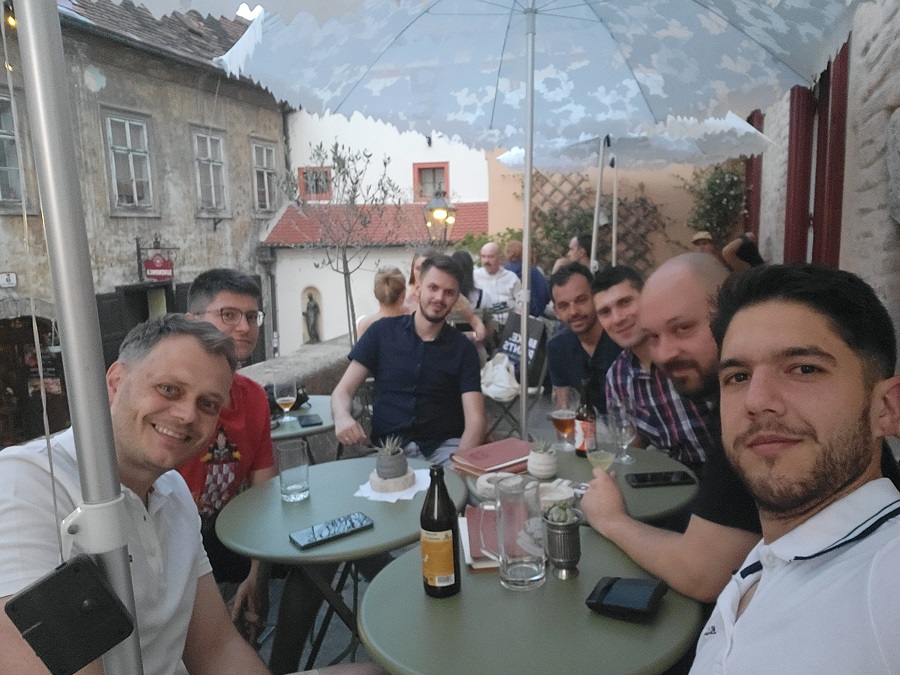
2. What did your family and community back home think of your decision at the time?
Besides my family, I didn't tell anyone I was going. My rationale was that people who had never made this choice before would only fill me with doubt. I only really opened up to people who were already living in Croatia and a few people that had come back. My family was cautiously optimistic at the time but today are very supportive now that they know that all it takes to make it is to not make too many stupid decisions, be a bit creative with how you earn a living, and a lot of hard work (like it's any different elsewhere?).
3. Where did you get your information about the realities of Croatia prior to coming?
I researched tech companies in Croatia and became optimistic. I made a bet that there would be at least one company with a need for my skill set. It took a while to get to that coffee with the right CEO, but it paid off. The reality is that it's difficult to know anything about Croatia without actually living here. If you associate yourself with the right people, ambitious and positive people, you'll make it.
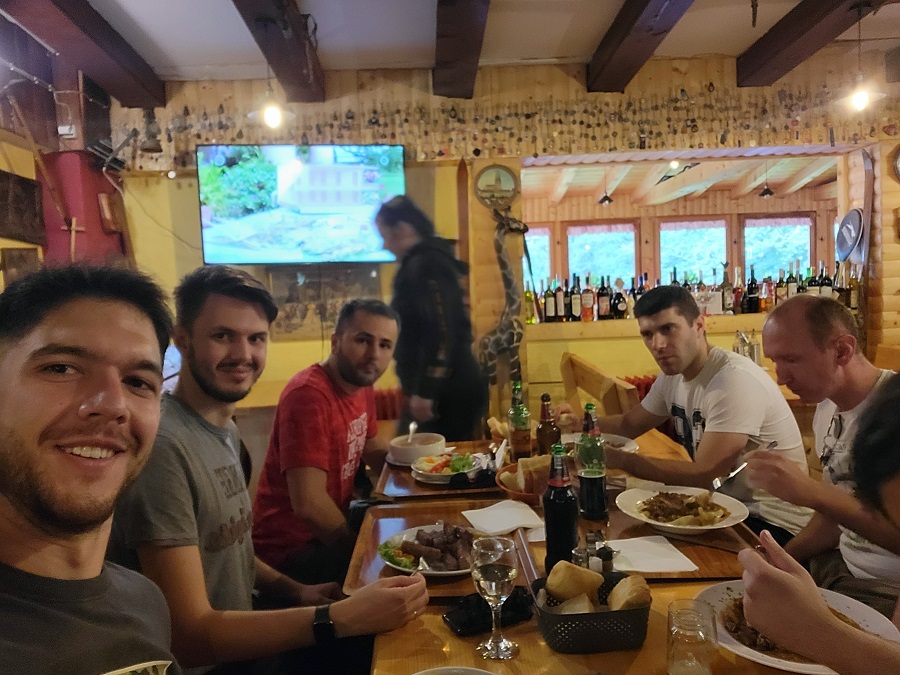
4. What were you most nervous about making the switch? What was your biggest fear, and what was the reality of what you found?
I came to Zagreb in the winter of 2018/2019 from Australia, a place whose winter is considered beach weather in 90% of the rest of the world. It was cold, my Croatian was terrible, and my bank account turned into a countdown to homelessness.
I acted on the one piece of advice trusted people had given to me in Australia: "it's who you know that counts". So what do you do when you know absolutely no one in Zagreb? You start doing what Croatians do best, go out for coffee.
Before long, my coffees took me all around the country, and it taught me a very valuable lesson: to get value, you must give value. This 18-month caffeine binge lead me to one of the best job interviews I ever had and resulted in a job with a world-class tech company.
What's the reality of coming here? With the right group of people, you can really live your dream life. After 4 years, I've discovered that if you talk to 1,000 returnees, you'll learn 1,000 different ways to "make it" in Croatia. But the people who didn't make it all tended to make the same two mistakes: stubbornness and isolation. If you're serious about returning, avoid the following:
- Don't brag about who your parents or relatives are. It never ends well.
- Don't flash cash from your savings account. It won't last long.
- Never ever talk about how you're going to "save" Croatia. Every month there's a returnee who tries to pull this stunt.
Put your head down, work, be friendly, and very quickly, you'll see support coming from everyone around you. That's the reality, be humble and help people. There are very good people here; they just need to be sure you're genuine.
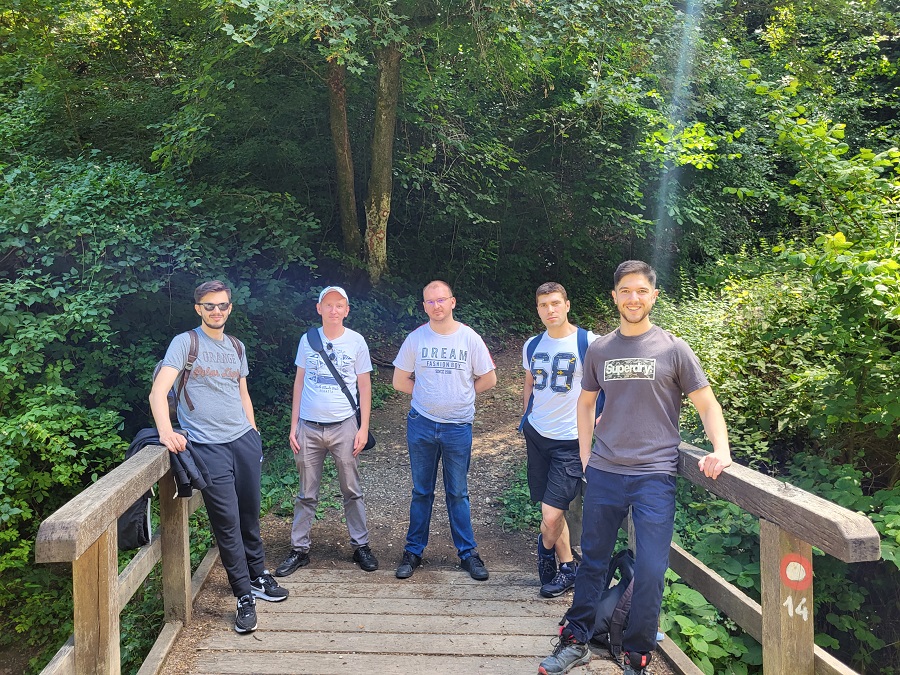
5. Think back to the time before you arrived. What were your perceptions about Croatia, and how were they different from the reality you encountered?
This is no longer pre-war Croatia; it's not 1991 Croatia, it's not even 2008 Croatia. This is 2022 Croatia, an EU member state with a passionate but informal entrepreneurial culture. Those on the outside only see the headlines or what's shown on TV. What they don't see are the networking events, the tech start-ups, and the company parties. Croatians are very quickly learning how to make high incomes, and their work ethic can be world-class. The people I'm describing are currently a minority, but they love the fact that the world underestimates them. They are constantly looking for like-minded professionals to build new connections with.
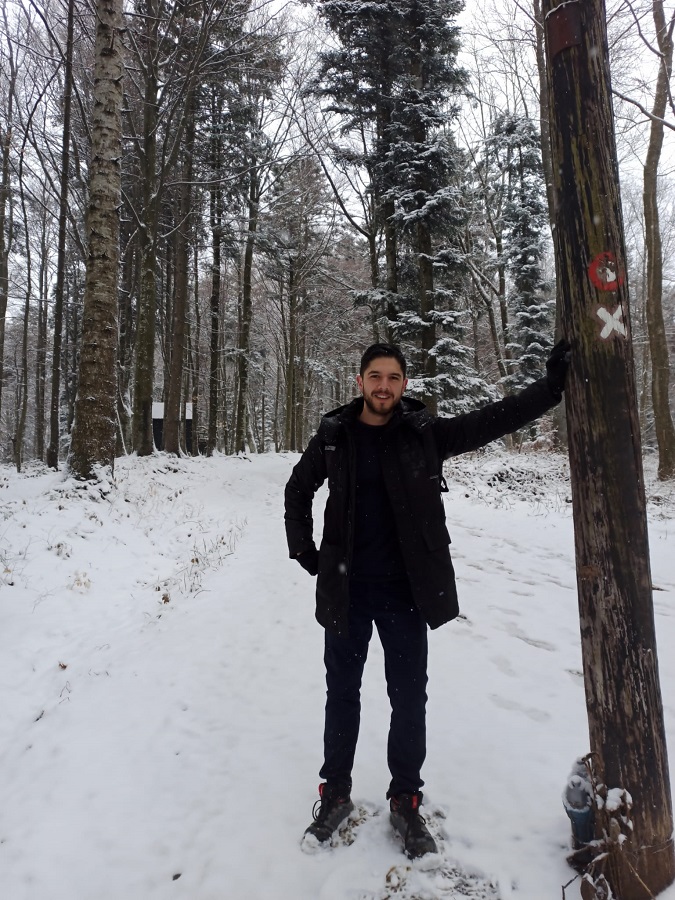
6. You are still here, so obviously, the pros outweigh the cons. Tell us about some of the things that you love about being in Croatia, as well as some of the things you don't like.
Things that make me love Croatia::
- The nightlife and work opportunities
- Hiking in the mountains, going to secluded beaches
- Other Croatians
Things that give me a headache in Croatia:
- The bureaucracy
- People who drive a BMW in Zagreb
- Other Croatians
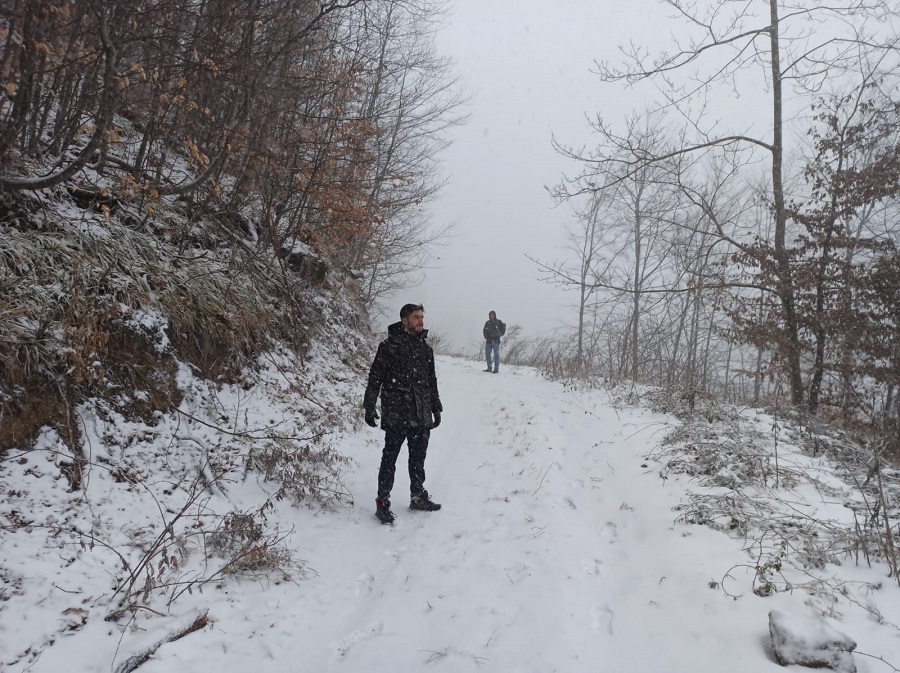
7. What advice do you have for others thinking about making a move from the diaspora?
Talk to other returnees before you make your decision. We all have an online presence, and someone will be able to connect you to someone that can advise you properly. There is no single solution to living here, find someone who came from a similar situation and ask them what they did. The rest is fairly straightforward: get your citizenship in order, be in a profession that can work remotely or be a tradesman, and be ready to rebuild your network from the ground up.
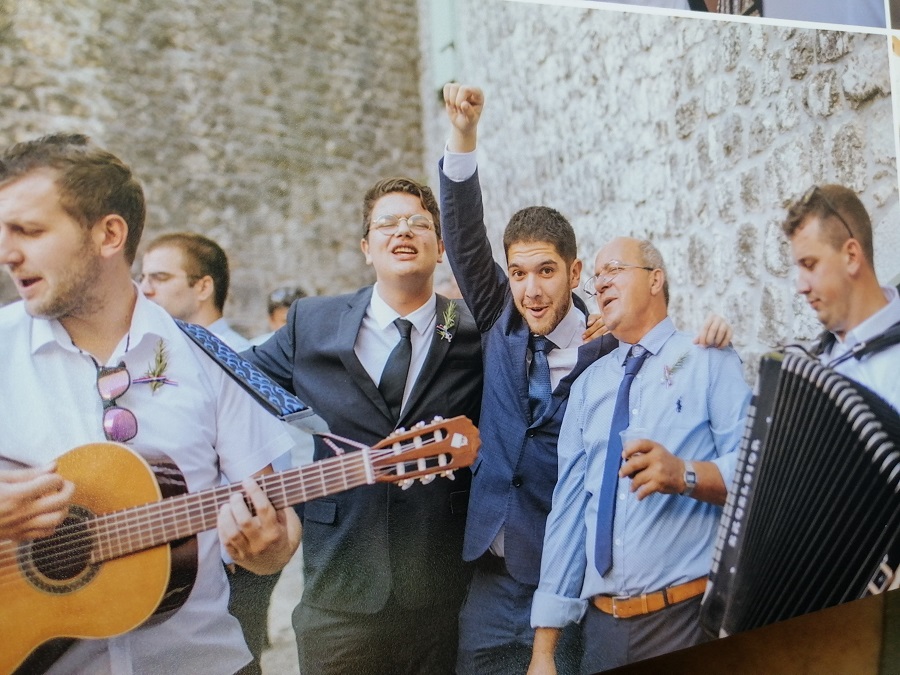
8. How do you think Croatia can better assist those who are looking to return to the Homeland?
We currently live in a sweet spot of Croatian history. Moving to Croatia is perceived to be so difficult that only the people that really want to come to do so. None of the returnees have a boring backstory. If you want to return to Croatia, now is the time you'll get the most support from other returnees. Purchasing that one-way ticket gets you at least one coffee with absolutely everyone.
But, if we wanted to make this process easier:
- Make it easier for the Croatian diaspora to obtain their citizenship or at least make it easier for them to live here for several years legally
- Make it well known what services the country has to offer. There is a lot of information freely available online that most people don't know about.
- Give Croatian companies better incentives to network with foreign companies, thus exposing more potential returnees to our economy
- Instill a sense of security in returnee families by publishing and committing to long-term city planning. Let people know where new schools, medical centers, transport links, and housing will be built
There are a million ways to make Croatia better. What's the worst that can happen in moving here? For me, it was living again in Sydney, a winning lottery ticket for most of the world. I had nothing to lose.
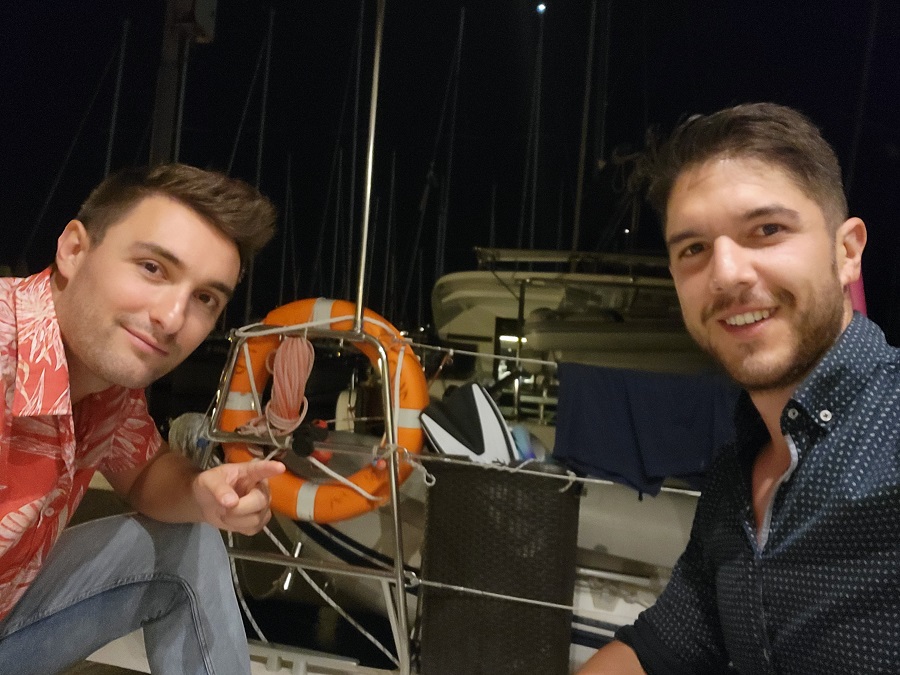
****
Thanks, Andrian!
You can follow more stories in the Croatian Returnee Reflections series in our dedicated TCN section.
Would you like your returnee story - positive or negative - to be featured in this series? Contact This email address is being protected from spambots. You need JavaScript enabled to view it. Subject Returnee.
****
What's it like living in Croatia, and where can you get the best survival tips? TCN CEO Paul Bradbury and TCN Editor Lauren Simmonds have teamed up to publish Croatia, a Survival Kit for Foreigners.
Follow Paul Bradbury on LinkedIn.

Croatian Returnee Reflections: Marko Petric, from Berlin to Zagreb
September 29, 2022 - Whisper it quietly, but more and more people are relocating to Croatia from the diaspora. In a new TCN series, we meet them to find out how they are faring and what advice they have for others thinking of making the switch. Next up is Marko Petric, who moved from Berlin to Zagreb.
I was born in 1993 in Split, Croatia. I am the oldest of three children born to our mom, a Croatian language professor, and our dad, a telecommunications engineer. My siblings and I grew up in lovely Posusje, in the West Herzegovina region of Bosnia-Herzegovina.
Thanks to a generous merit-based scholarship, in 2009, I moved away from home to finish my two last years of high school at the United World College in Mostar (UWCiM), where I lived and went to class with kids from more than 40 other countries.
Then, I got a full-ride scholarship to study at a liberal arts college in Maryland (Washington D.C. Metro Area). I was pretty involved in campus life there, having served as Class President and Model United Nations president, which in turn led to an opportunity to speak at the United Nations General Assembly Hall in New York City at some point.
After four transformative years, I graduated with a degree in Political Science and French and started working in PR and marketing as part of the largest network of nonprofits in the U.S., fighting for education, health care, and financial stability. I lived in the States for almost seven years. In April 2017, I packed my whole life in a suitcase and left. Admittedly, I was heartbroken about it, but the uprooting taught me an important lesson — one of letting go.
After that, determined never to return to my hometown or Croatia, I ended up in Bergen. In case you’re not familiar, Bergen is Norway’s second-largest city, nestled between seven mountains on the west coast of this stunningly beautiful country. It’s also one of the rainiest cities in the world, and as you can imagine, this Mediterranean boy was not having it. I left after about eight months.
On my way out, I stopped by Berlin, Germany, for what was supposed to be a two-day trip. As I was there, I realized Berlin had a thriving startup scene. I had already been looking to break into the software industry, so naturally, I found myself wondering: "Why not move here?" Everything happened kind of quickly — almost accidentally, even — but I did end up living there for two years. I loved every minute of it.
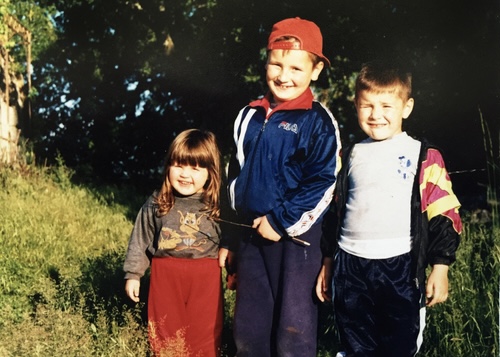
1. You made the switch to Croatia. Tell us a little about the decision process and how long it took for you to get on the plane.
Yes, eventually, I did the exact thing I swore I'd never do: I moved to Zagreb.
It's funny how life can take you on unexpected journeys. Although I was drawn to return closer to home, there was a part of me that felt reluctant. It felt like admitting defeat in some game I was playing with myself — subconsciously, at least — and I initially refused to consider it as a sensible option.
But after months of consideration, I realized that moving to Zagreb could be just the thing I needed to grow both personally and professionally. Being closer to the beautiful Adriatic and my parents in Herzegovina was a major advantage. And as a digital marketing professional, I knew I could continue my work as long as there was a stable internet connection, which there is.
It was a difficult decision, but sometimes we have to take a leap of faith to find our true path. This felt like one of those moments.
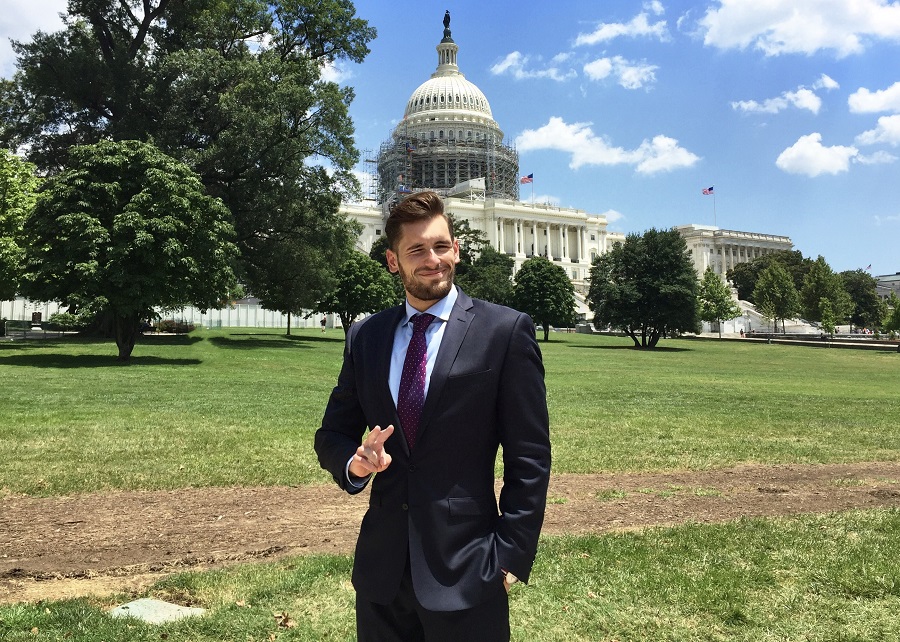
2. What did your family and community back home think of your decision at the time?
I got a mix of reactions. All my friends were a bit perplexed, but they said: “Happy if you’re happy.” My parents always supported me in all my decisions, and they were elated that I was moving closer to home. That was for sure. However, I could tell they were having some reservations because they knew I had worked my whole life to build a better life elsewhere. Of all three kids, they always considered me the least likely to move to Croatia. So the irony was evident to us all: Both of my siblings were already living abroad when I announced I would be moving to Zagreb. The lesson I learned from this move was to never say never.
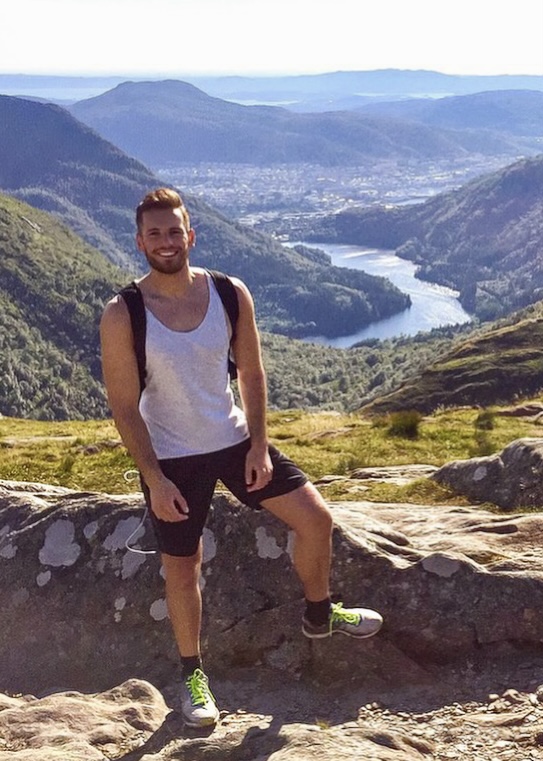
3. Where did you get your information about the realities of Croatia prior to coming?
At that point, I stopped keeping track of local news in Croatia. I knew HDZ was in power, Andrej Plenkovic was the serving PM, and there were two weekly flights from Zagreb to Berlin (in case I wanted to run back). But beyond that, I didn’t know much because I had never lived in Croatia for the long haul before.
So in many ways, it felt like moving to a foreign country. After almost a decade spent across the U.S., Norway, and Germany during my formative years, moving back to the Balkans required me to reacclimate to the local ways of being.
I was lucky to know some people here already, so I relied heavily on friends to give me the information I needed ahead and after our move. Of course, I also researched information online across many sources, including TCN.
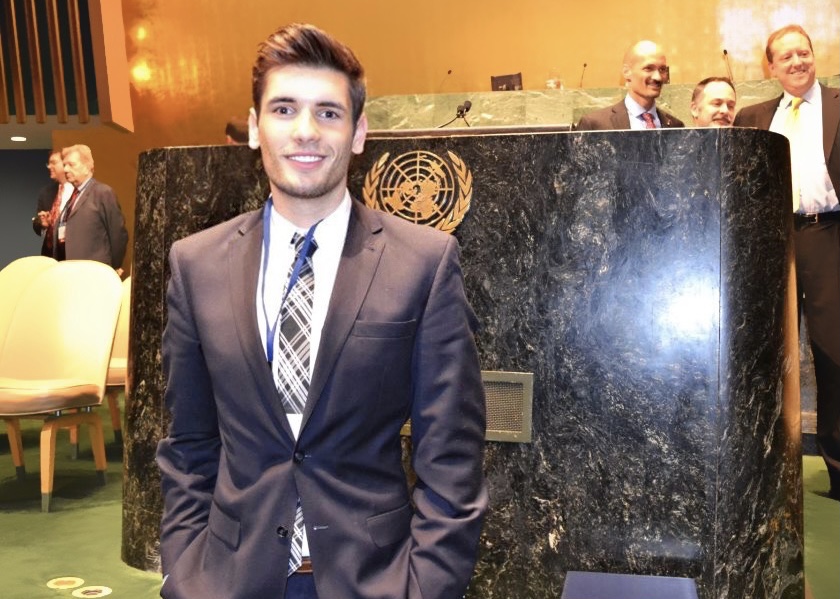
4. What were you most nervous about making the switch? What was your biggest fear, and what was the reality of what you found?
Job opportunities and economic circumstances at large were my two main concerns. Considering the lower standard of living in Croatia relative to EU members in the west and the north, I knew my best shot was freelancing. As 2020 rolled around, amid the pandemic and a global shift to a new, digital reality, I finally decided to make my side gig my full-time gig. And that is the story of how MP Creative Services, my full-service digital marketing business, was (officially) born.
Currently, MP Creative Services is on the back burner, as I am focusing on a role I took at Five, an Endava company. As a growth marketing specialist there, I work at the intersection of marketing, behavioral economics, data analysis, and product design to drive mobile app growth for some cool U.S. brands.
5. Think back to the time before you arrived. What were your perceptions about Croatia, and how were they different from the reality you encountered?
"Hercegovac u Zagrebu" was not a cliche I planned on embodying at any point in my life, but I became precisely that when I moved here. The metamorphosis implied developing specific coping mechanisms for when I’m just going about my business and someone starts talking crap about Hercegovci. The funny thing is, when I was younger, I tried to distance myself from that part of my identity as much as possible (probably because of its negative connotation). But as I grew older, I embraced it, and now I find myself defending it against libelous Purgeri — generally, in a playful, joking context.
As an openly gay man, my other big concern was that I did not want to go back into the closet and start denying that part of my identity again — one that I worked so hard on embracing in the first place.
Croatia is a deeply conservative society, with traditional Catholic values at the core of the nation's DNA. I was worried that I would struggle with that, but I decided never to reduce myself or pretend to be someone else for the comfort of others. I needed to be brave and true to myself at all times. I understood that, with every interaction, I had the opportunity to dispel misconceptions and build dialogue — hopefully, seeing a change of heart in someone every once in a while. This matters to me because it's not just about me; it's bigger than that.
To my surprise, I’ve experienced more kindness during my time here than I ever expected from the people of Zagreb and Croatia. It was to the point where I felt like the closed-minded one because of how stubborn I was in the generalizations I made about an entire population. Of course, this does not mean other gay boys/men and girls/women across the country are not suffering injustice and inequality daily. But based on my experiences with people whose paths crossed mine, I am more hopeful about the kind of society we can build for future generations than I have ever been in the past.
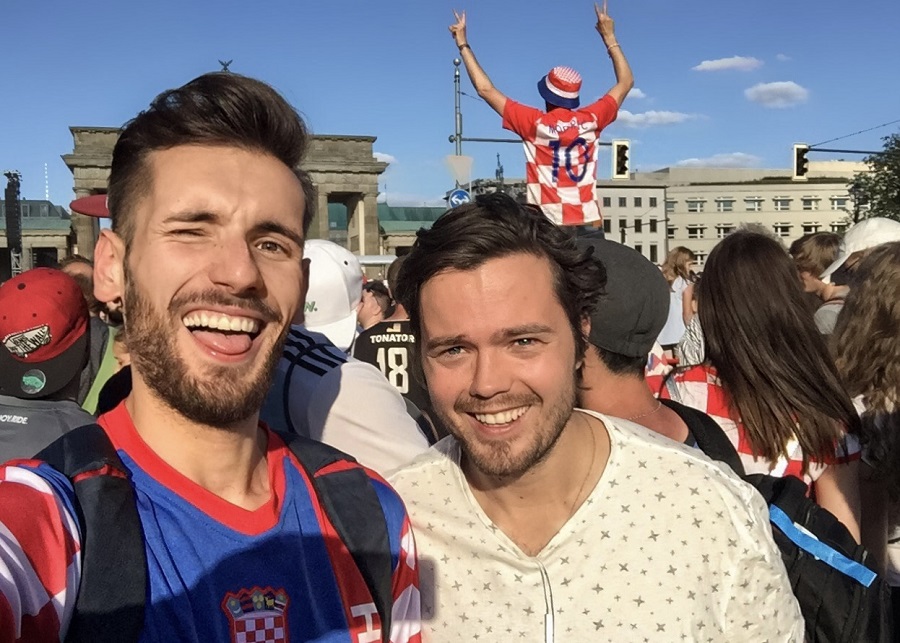
6. You are still here, so obviously, the pros outweigh the cons. Tell us about some of the things that you love about being in Croatia, as well as some of the things you don't like.
Well, I have been here for almost three years now. And I would be lying if I said I have fallen in love with living in Zagreb. I am still working on it. On the one hand, I have fallen out of love with Croatia because — now that I live here — I have stopped idealizing it. On the other hand, I have also fallen in love with it because of the people who live here, the passion and dedication I see them put into the things they do, and the great stuff they bring into the world when they put their minds to it.
Sure, many aspects of living in Croatia suck. There’s no sugarcoating it. Food, rent, and utilities are too damn expensive, yet salaries remain below the EU standard for most. Things are about to get even worse with inflation raging and the winter coming. Working families and seniors are affected the most. Speaking of seniors, too many retired people have no choice but to supplement their income by digging through the trash, looking for discarded bottles to trade in for a couple of kunas. Such is the fate of the average worker retiring in Croatia today.
We’re still using Tito's Communist regime and the Homeland War that ensued as a scapegoat for everything wrong in the country today — almost thirty years after the war ended. In the meantime, corruption remains widespread, killing the system from the inside, like Stage 4 cancer. In terms of rights, many have none. Women's rights are still an issue, as are gay rights, ethnic minority rights, and the rights of immigrants arriving on the border. The list goes on… But keeping things in perspective, no country is perfect. In my book, it comes down to finding someplace worth fighting for, someplace worth calling home. I suppose I found that ‘something’ here.
In 2003, Berlin Mayor Klaus Wowereit famously called his city “poor but sexy”. Berlin is no longer poor, so I will take the liberty of conferring this title upon Zagreb. Poor but sexy is a great way of describing it because its charm is indeed in the rundown Austro-Hungarian facades, colorful street art, trendy food spots, and hipsters hanging in front of the National Theater.
Don’t forget about the balmy summers, either! The city clears out, and you can enjoy parks, forests, and Jarun Lake all to yourself. And as the summer slowly fades away, all the artists, creators, innovators, and other eccentrics who call Zagreb home return. The city comes alive again, almost overnight. Before you know it, it’s time for Advent — Christmas lights, ice skating, mulled wine, and friends.
Okay, fine! I do like Zagreb.
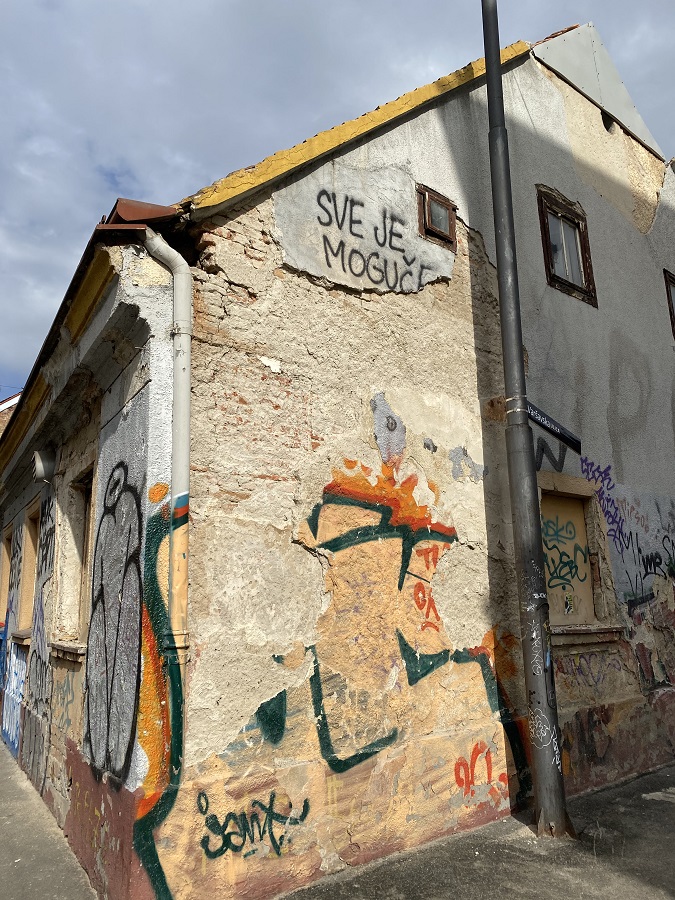
7. What advice do you have for others thinking about making a move from the diaspora?
Just do it!
That would be my advice to anyone considering moving to (almost) any country. I think embracing the unknown, leaping into uncharted territory, and taking yourself out of your comfort zone is the only way to grow. And trust me when I say: Croatia will give you a run for your money.
Worst-case scenario: Even if you end up hating it, you always have the option of moving back home. The country you, your parents, or your ancestors went to in search of a better life. Perhaps they found it. Perhaps not. In any case, we all get to be the authors of our own stories. The world is your oyster. (And serendipitously, Croatia is one of the best places on the planet to sample this decadent treat. If this is not a sign…)
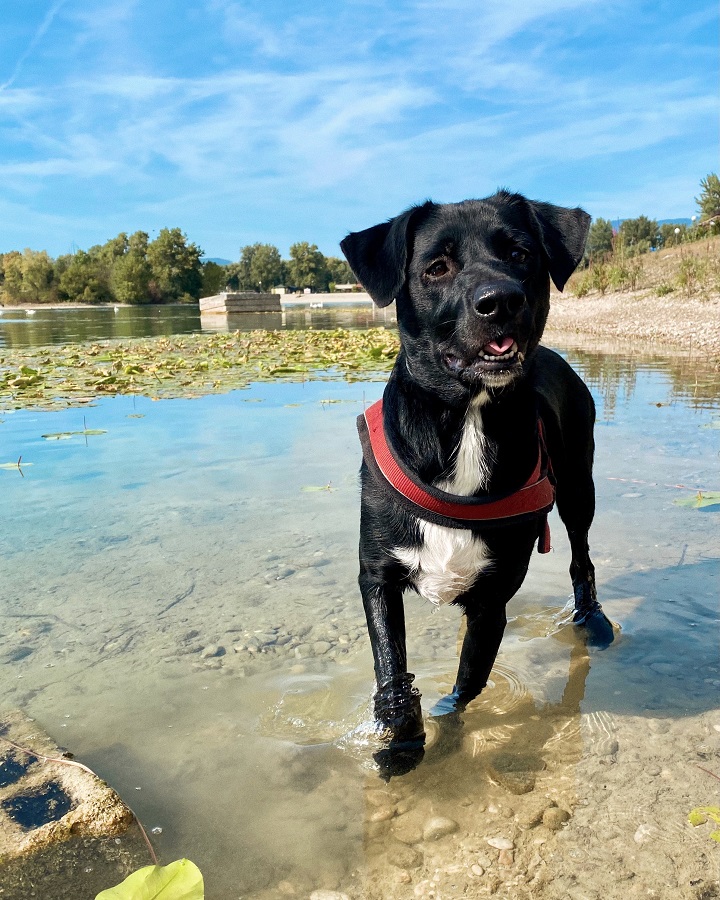
8. How do you think Croatia can better assist those who are looking to return to the Homeland?
Oh, man, where do I even start…
Generally, I think our government should actively be looking into ways to make it simpler for people to come here and contribute to our society, whether it’s by bringing know-how or investments, opening a business, starting (or moving) a family here, or any other number of ways in which they could enrich the fabric of our society.
Tax cuts for the first year might be a reasonable idea to explore. Programs assisting families moving with kids with needs such as daycare, school, medical care, and so on. And in the post-pandemic world, offering more online resources across a spectrum of public services is paramount. This opens up the door to opportunities to work closely with the private sector, especially tech companies that have the know-how to bring forward-looking, ambitious ideas to life.
Andrej Plenkovic’s government, as profoundly flawed as it may be, seems to understand this on some level. The digital nomad visa project is a great example: While ‘forward-looking’ is not a word I’d use to describe much else of what goes on in Croatia’s politics these days, this truly is the kind of rare political project that can have a deep and lasting impact on the country’s growth trajectory. Though the effort was spearheaded by the Dutch-born entrepreneur Jan de Jong (arguably a greater patriot than most native Croats), the government still handled the legal and logistical prerequisites with unprecedented expediency. I bet no other political project was executed that fast in the country’s modern history.
Then, there’s also the question of the booming software industry, expected to surpass the behemoth that is tourism in a few years in terms of value-add GDP. Yet government policies had very little to do with that success. Croatian software companies are achieving truly remarkable results on the global scale with no outside help. As a country, we should be making it easier for them to attract talent and investments. By designating the software industry as a strategic, thereby empowering promising startups, we empower the Croatian economy, making it more resilient to pandemics, wars, inflations, and other capitalist maladies.
California is fine and well, but it’s possible to build a multi-million-dollar company in Croatia too. It’s been done several times over the past 10 years, and there’s always room for more innovation. Also, we’re lucky to have many in the Croatian diaspora communities around the world in our corner. Many passionate people out there have the expertise, the motivation, and the cash to help build Croatia’s “silicone dream”.
Little geniuses are sitting in schools across the country right now. With the right support, in the future, these kids might find solutions to some of the world’s most pressing issues — maybe even save the world. This is why I hope we divert more resources to education, bringing our schools and universities up to par with those in Finland and other countries pioneering new, innovative education models. We have to make sure we start introducing kids to technology as early as possible, giving them the tools they need to learn new skills. That’s how we attract more families looking for a safe place to raise their little geniuses.
****
Thanks, Marko!
You can follow more stories in the Croatian Returnee Reflections series in our dedicated TCN section.
Would you like your returnee story - positive or negative - to be featured in this series? Contact This email address is being protected from spambots. You need JavaScript enabled to view it. Subject Returnee.
****
What is it like to live in Croatia? An expat for 20 years, you can follow my series, 20 Ways Croatia Changed Me in 20 Years, starting at the beginning - Business and Dalmatia.
Follow Paul Bradbury on LinkedIn.
Croatia, a Survival Kit for Foreigners will be out by Christmas. If you would like to reserve a copy, email This email address is being protected from spambots. You need JavaScript enabled to view it. Subject 20 Years Book
Alenka Jurasic: Dear Croatia: It is Not Me, It's You
September 27, 2022 - Not all Croatian returnee stories are happy ones. Alenka Jurasic with a very candid overview of making the switch from Toronto to Volosko.
Dear Croatia:
It’s not me, it's you...
After leaving my job of 20 years in the hospitality business in one of the best bars in Toronto, I made my way to Volosko, Opatija in June. Notice given and accepted, legendary goodbye party in the books, apartment sublet for 3-6 months, bags packed, triple vaccination certificate in hand, I made my way to my home for the summer, what I hoped would be my home for the future, Croatia.
First and foremost, there was more than one reason for me to make this move. It was not sudden or out of the blue. The move came through a series of breadcrumbs that led me here to this point in time. I had an apartment my mother left me in one of the most beautiful seaside villages I had ever seen. The sprawling place had been her very happy home for 20 years of retirement, and the view from the balcony was something I had never experienced on a daily basis before. I had a whole brood of cousins living across the street who I adored, and then the sea, ah the beautiful sea, was a 5-minute walk from my front door. After 2 and a half years of lockdowns, shutdowns, mask mandates, vaccination requirements, capacity mandates, and everything being closed for months on end in Toronto, I began to really consider what I wanted my life to look like… and it was not looking like Toronto was the place for me anymore.
Plus, with my dad being very ill with stage 4 cancer and in a home in Croatia. I figured this would be an opportunity to spend the summer not only on one of the most beautiful coastlines I had ever seen but also to help him through his last days of life. Nothing seemed more reasonable to me, and the breadcrumbs led me to Volosko in June 2022.
I took a plane, and bus taxi, entered my inherited home, dropped my bags, and sighed as I quickly changed into a bikini, grabbed a new book and a towel, and made my way down to the sea. I had arrived. All my Croatian friends congratulated me on the move well done, if not way too late. My family welcomed me with open arms and open bottles of Pelinkovac. My father somewhat stubbornly remarked, what took you so long, but conceded he was happy to have me so close by.
It didn’t take long for things to get “tough,” but I had anticipated this, somewhat naively, I can now admit. Language barriers, culture barriers, and lifestyle barriers hit me straight in the face like a flying bat in baseball.
First, it was the prices…how did everything all of a sudden get so much more expensive? From food to drinks to excursions - nothing was as cheap and cheerful as I remembered it. And speaking of cheerful? To get a warm greeting or a smile from a hospitality worker or someone in the service industry was very few and far between. Going out to eat went from being a joyful experience to one of frustration and disappointment. Having been in the service industry for my entire life, I couldn’t fathom how a country that lived solely off tourism could provide such a terrible experience again and again and again. Mediocre food for fine dining prices. Now, I must admit I am a pretty picky restaurant-goer. I believe and respect the experience - sometimes more than I respect the quality of the product. So I have to say that I am extremely disappointed with my overall Croatian dining experience. Like wtf. I have waited 10 -15 minutes just to receive a menu. Then I have waited an indiscriminate time for my drink to arrive. I have been overcharged and ignored, and I seem to feel like I am in the waiter's way and not that they are there to give me quality service and an experience. I am a bother, not a valued guest spending hard-earned money.
Transit tickets are more expensive than taking the transit in Toronto (where the median salary is 5 times higher) for a system that is beyond in need of maintenance and upgrading.
3.25 CAD for a ride in Toronto to wherever you want to go and 3.45 CAD for a ride only in a 3-zone range. I’ve been on buses when it was so over capacity that it was dangerous, and young girls were fainting from the heat and nowhere to move. Long distance buses hours late with no one to tell you what is going on and when they might be expected. This is at bus stations with no seating or adequate washroom facilities. I have taken the same route to the same stop and been charged three different fares. When questioned, no driver knew the reason why it was so. I have not gotten change back and been charged a full rate and given a ticket for a cheaper rate so the driver could pocket the extra kunas. I have never in my entire life living and taking transit in Toronto ever seen a young generation more rude while on the bus. Teenagers and young adults nab the seats, and senior citizens and older folks with groceries are left to stand the entire way to their stop. It is not just sometimes; it is every day. My Croatian mother would have bopped me over the head had I not given up my seat to someone who looked even 10 years older than me. The kids scream and joke and goof around and get on without paying, while Nona and Nono are left to hold on tight to the railings through the hairpin turns. Disgusting. I am embarrassed for this new generation. I have argued with bus drivers, been talked down to, cheated, and dismissed. When I asked for my change once, I was told he did not have it, and it was not much anyway, so not to worry about it… the Canadian in me is appalled.
Trips to social security have left me dreading having to go back. One time I knocked politely on the door and waited - only to have the doorman/guard open the door begrudgingly a few minutes later, admonishing me as to why I did not just enter- that he was not a butler! I explained to him that in times of pandemic and covid, it was expected not to barge into an office but to wait politely outside in case they were at capacity. He grunted. I was surprised he knew the word butler.
Being a pedestrian in this country is like taking your life into your hands every time you step outside. Cars parked belligerently on every sidewalk, so you are forced to walk on the very busy small road hoping that traffic will not smash you to bits.
Trying to navigate the health care system is another nightmare that not only a foreigner but every Croatian who cannot afford paid healthcare has to go through. How many trips to the hospital with my very sick father ended up with me in an argument as to why I don’t have the proper forms and that I need to go here for this and here to pick up that and wait hours to see a doctor in a waiting room teeming with sick folks waiting for their blessed turn to please see someone to help them feel a bit better. One building for the test, then you have to pick up the results yourself to bring to the next building, and so on and so on and so on. It was so confusing and difficult that my poor, very sick father gave up, and I had to fly over from Canada to help an 81-year-old man to get to see someone to help him deal with cancer. It took 7 weeks in total to get a diagnosis and to get treatment started. I myself saw a chiropractor for major lower back pain, and to be told it's 80 CAD dollars for 15 minutes of work, and no he does not take credit - cash only. He scoffed when I asked to pay with a card. Cash only, cash only, cash only. Words that you will hear in many places around this tourist-based country.
No one will tell you that there is not a common taxi system here like there is in most modern countries - a standard fare and commute. I learned that the hard way. What was usually an 80 kuna ride, I was charged 140 kuna and the taxi driver told me that they were a private company and could charge what they wanted..no meter. Cash only. So in a city of no Uber I learned that you have to ask what the fare will be upfront so as not to be shocked when you step out. My ride from the airport to my friend's place taught me that. I nearly fell out of the cab in shock when I arrived and was told a 15-minute ride cost me almost 80 dollars.
Jebiga, jebote and kurac are all I heard when I tried to explain my experience to others. If they are rude to you, be rude to them is what I was told. But it is not in me to be rude. Today I went to pay a bill at the Fina, and the cashier pushed it back to me. And I pushed it back to her. And she impatiently said (hearing that I was a foreigner with my thick accent) that I needed to fill out a payment slip which she pushed across the desk to me. Not knowing the language, I painstakingly filled out the form myself while she sat there and sighed and was impatient with my ineptness. I don’t need to be bowed to and coddled or handled with kid gloves; I just need a bit of patience and kindness and help. I want to be here, I want to belong. I want to pay my bills fast and take the bus without hesitation and not dread dealing with rudeness or animosity. But those experiences are few and far between. And when you find one nice experience, it can change your day by God!
Funeral expenses _ cash only. Who pays cash for a 2500 $ funeral? Getting a new remote for my garage door - cash only and no receipt. Over and over in a system that has no system. Maybe I am too Canadian and too “nice” as we Canadians are known, but when has nice ever been a detriment to society?
I will never forget my first argument in the hospital with the receptionist when I came from Canada to help my dad get care. We had an appointment with the throat specialist. We waited. We were called, and I handed over the form my dad's family doctor had given us. It was the wrong form, and I was told to get another form and come back. I said no. She said what. I said no, I was not coming back, that we had an appointment my dad had social healthcare and that we wanted to see the doctor. She asked me if I understood her, and I said yes, but I did not understand why we could not see the surgeon if we had an appointment he had his medical card, and I had come from Canada to get him this help. So NO, I was not leaving and getting another form, and I did not understand and we were going to see the doctor. The horror! After much hesitation and annoying looks, she spoke to the surgeon, who took us immediately as my father's case was urgent. I had to promise to send the right form the next day. Now getting to see my family doctor was another thing, You can call and call and call but never get through to make an appointment because no one really answers the phone there. You have to show up and wait and then get admonished for not making an appointment, but you had tried for hours and days on end. And so on and so on and so on.
One thing after another, and I tried and tried. Is it me? No, it's not, it is you Croatia. Unfortunately for us both. Not only did you not make it easy, you made it really hard.
****
Thanks, Alenka!
You can follow more stories in the Croatian Returnee Reflections series in our dedicated TCN section.
Would you like your returnee story - positive or negative - to be featured in this series? Contact This email address is being protected from spambots. You need JavaScript enabled to view it. Subject Returnee.
****
What is it like to live in Croatia? An expat for 20 years, you can follow my series, 20 Ways Croatia Changed Me in 20 Years, starting at the beginning - Business and Dalmatia.
Follow Paul Bradbury on LinkedIn.
Croatia, a Survival Kit for Foreigners will be out by Christmas. If you would like to reserve a copy, email This email address is being protected from spambots. You need JavaScript enabled to view it. Subject 20 Years Book
Croatian Returnee Reflections: Nadia Milevcic, from Buenos Aires to Rijeka
September 24, 2022 - Whisper it quietly, but more and more people are relocating to Croatia from the diaspora. In a new TCN series, we meet them to find out how they are faring and what advice they have for others thinking of making the switch. Next up is Nadia Milevcic, who moved from Buenos Aires to Rijeka.
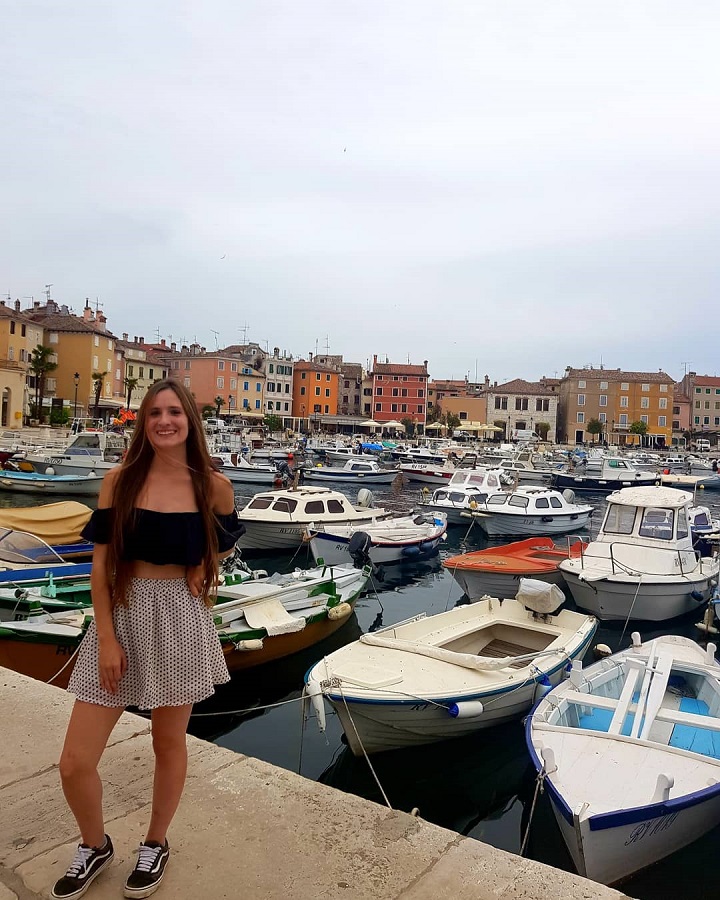
My name is Nadia Milevčić, I was born in Buenos Aires, Argentina, and I am 27 years old. My relationship with Croatia was always very strong because four of my great-grandparents were Croatian and went to Argentina in the 1920s. They did not meet in Croatia but in Argentina, where they made a family. My dad grew up among Croatians, and that tradition came down to my family. Since I was very little, I was aware of my Croatian roots, and that is why I always wanted to come here. In Argentina, I studied literature, and I worked as a high school teacher, but when I won the Croaticum scholarship, I left my job behind and decided to travel to Rijeka. I loved my career and my life in Argentina, but I also felt that something was missing. I wanted to travel and see the world, connect with another culture and live in a place totally different than mine. At first, I was only going to stay for four months to study Croatian, but the outbreak of covid made me change my plans because I couldn't go back to Argentina. I finally spent almost two years in Croatia without going back to my country. At the beginning of this year, I spent three months in Argentina, but I realized that Croatia changed me and that I cannot stay only in one country. I love Argentina, and I will always be from Latin America, but these two years in Croatia marked my heart, and a big piece belongs to it. This country allowed me to feel free, cross limits that I had never imagined, and connect with people from all over the world. I grew up in every way and learned so much that I can't go back. Half of my life is in Argentina, but the other half is in Croatia, and for that reason, I travel every year from one continent to another. I still don't know where I'm going to build my life, but I know very well that I don't want to give up on either of them.
1. You made the switch to Croatia. Tell us a little about the decision process and how long it took for you to get on the plane.
In Buenos Aires, I decided to take classes in Croatian language and culture with my dad and my brother. This was my first meeting with a Croatian person who not only taught us about the language and culture but also told us about the history of his country with a lot of love. It also brought me closer to other descendants of Croatians who also wanted to strengthen their roots and get closer to the culture. In parallel with this process, I began to look for information to obtain citizenship, and for this reason, I went to the embassy. There they told me about the Croaticum, a program for friends and descendants of the Croatian people. At that moment, the possibility of traveling and living for a while in Croatia began to take shape in my head. I was finishing my degree in Buenos Aires, and I thought it was a good time to try it. I applied in May 2018, and they did not give me the scholarship. At the end of the year, my Croatian cousins (whom I did not know) contacted me through Facebook. We quickly established a good connection, and this was a sign to me that I needed to try again. In 2019 I sent my application to study in Rijeka again, and this time they gave it to me. I remember that when I won the scholarship, my heart was overflowing with happiness, but I also had a hard time believing that I was actually going to travel to Croatia. Living in Latin America makes everything complicated from a geographical and economic point of view, and I would be lying if I said that it was easy to get here. If I succeeded, it was also because I received a lot of support and help from my friends and family, who knew that my biggest wish was to come to Croatia.
2. What did your family and community back home think of your decision at the time?
At that time, I had finished my studies in Argentina, and everyone knew that nothing could tie me to the country. From the Croatian lessons, the first unsuccessful scholarship application, and all my visits to the embassy, it was a project that had been in my head for two years. Everyone was happy for me because they knew of the effort and time invested in this idea. Especially, I think it was very important for my dad because I was the first person in our family to visit Croatia and meet our cousins. It was a bridge that we had yet to establish, but the fact that I was going to travel marked a beginning.
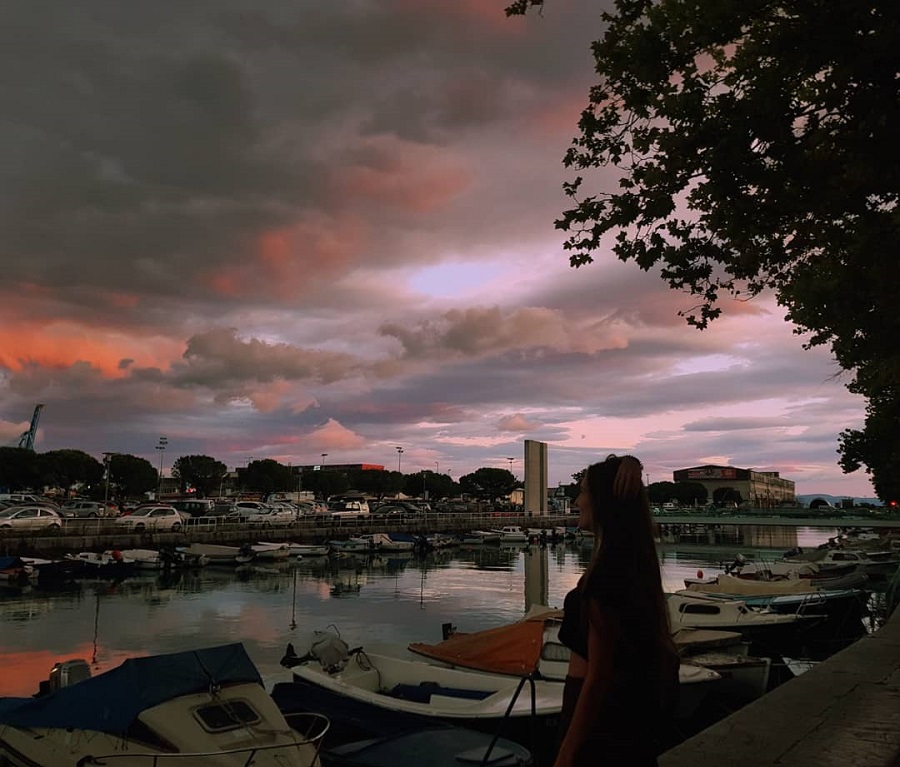
3. Where did you get your information about the realities of Croatia prior to coming?
My Croatian cousins and teacher gave me a good overview of the situation in the country. My grandmother had also traveled to Croatia in the year 2000, and she told us a lot about the country and our family, but I think that no one can prepare you and tell you effectively what you are going to find on the way. Nobody could have told me that a pandemic was coming and that it was going to complicate the process of obtaining citizenship. Or that it would also be difficult to get a job or have to take a semester online because the faculty was closed. No one could have told me that I was going to separate from my new friends so quickly due to quarantine. My first month in Croatia was very hard, and this was completely unexpected. I had to say goodbye to many people and places when I was just starting to get into a routine. I knew that my life in a new place was going to be a challenge, but I never imagined that it would be so hard.
4. What were you most nervous about making the switch? What was your biggest fear, and what was the reality of what you found?
I was scared to find myself alone on a continent and in a country, I didn't know. All this was like starting from zero for me, even though I knew I had a family in Rijeka who could help me and give me support. About the language, the culture, the people, and everything that could happen, I knew from the moment I applied for the scholarship that leaving Argentina meant facing the unknown. When I arrived, I was surprised by how warm my Croatian family was even though we had never seen each other. They picked me up at Zagreb airport and included me in their life as if we had known each other all our lives. This was very important to me, and to this day, I say that I was very lucky.
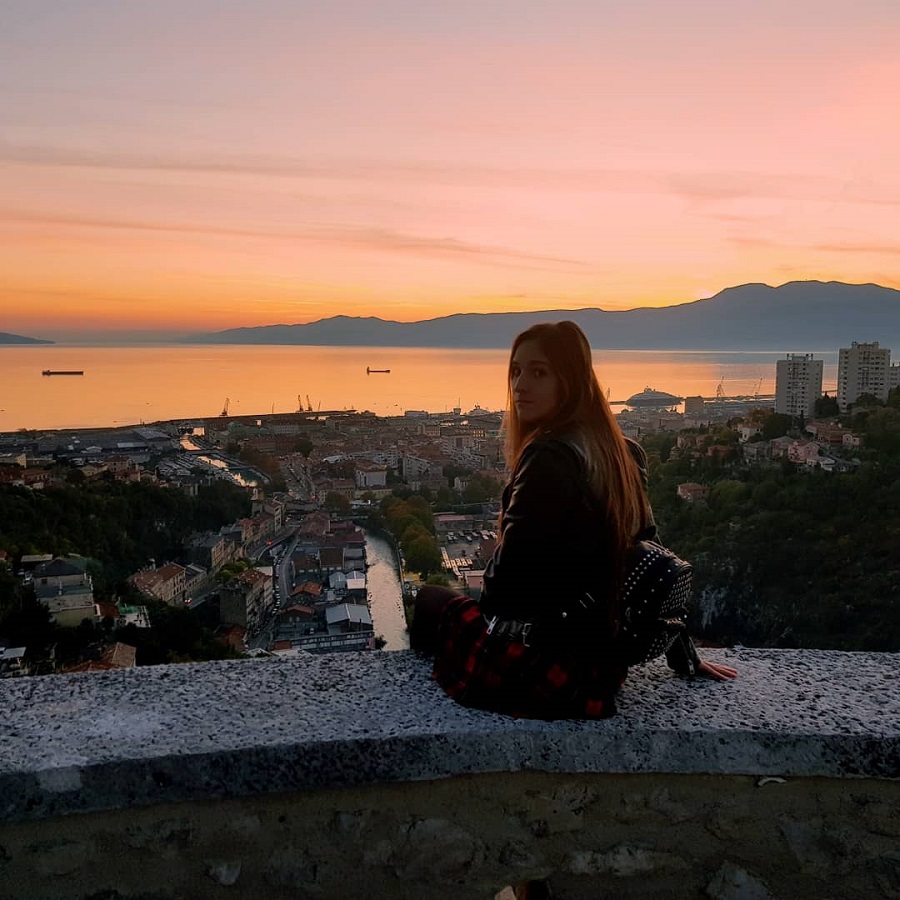
5. Think back to the time before you arrived. What were your perceptions about Croatia, and how were they different from the reality you encountered?
I thought maybe Croatians would not be so friendly to descendants because we weren't born in Croatia. However, I noticed that they were happy every time I explained that my great-grandparents were Croatian and that I was studying the language. Even if my Croatian was not good, they were always willing to help me and teach me. I also noticed that they themselves considered me a Croatian many times when I told them about my family history and the reason for my trip. I also believed that it would be difficult to obtain citizenship and that the police were not going to help me with this process. However, I noticed that they had a lot of consideration when processing the residence and citizenship. The importance given to blood is incredible, and that is why I saw that the workers also had patience and consideration with me. Processing citizenship was difficult in 2020 due to covid. It was difficult to obtain the papers from Argentina and present them in Croatia because the Foreign Ministry did not work in my country. Many papers expired, and my citizenship appointment was delayed. However, they understood, and I finally got citizenship. I honestly had high hopes for the scholarship, but I never believed that they would give me the same status as a Croatian student. On campus, I lived with Croatians, and they also gave me the opportunity to eat in the dining room for very little money. I used the same facilities and paid the same money as my colleagues. The campus is new, and it was a very beautiful experience to live in it for a year. In other words, this program not only allowed me to learn the language but also gave me the opportunity to pay little money for food and accommodation. I think this shows how important the concept of blood is and that the grandchildren of Croats return to the country. I believe that at a social level, descendants are given a very valuable place, and they do not treat us as foreigners.
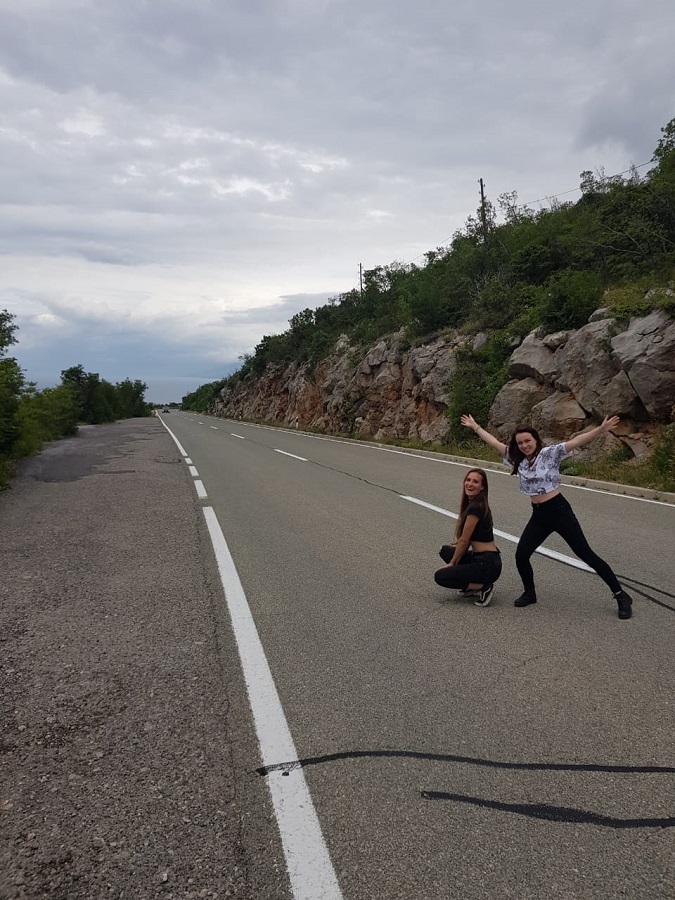
6. You are still here, so obviously, the pros outweigh the cons. Tell us about some of the things that you love about being in Croatia, as well as some of the things you don't like.
Croatia is not only a very beautiful country, but it is also very safe, and there are more job opportunities than in Argentina. It also has good connections with other countries, and many cities are always full of tourists. In Rijeka, there are many international students, and there is a cultural exchange that is very useful and interesting. I love the fact that Croatia brought me closer not only to the locals but also to people from all over Europe, and this opened my mind a lot. It also has a lot of things to do and places to explore; you can always go to a new island, climb a different mountain or visit a beach you have never seen. The country is also very calm; you don't have to deal with an excessive amount of people and traffic like in a big city. In Buenos Aires, I needed maybe three hours to make a trip that should last one. In this country there is no traffic, you can walk quietly down the street or drive without too many problems. I think there are a few things that I don't like. Mainly I think everyone smokes too much, and I can't get used to them doing it indoors. Maybe the rest of the things I don't like are explained by cultural differences, like music or food. I know that this would happen in any country, and they don't seem like a big reason to leave Croatia.
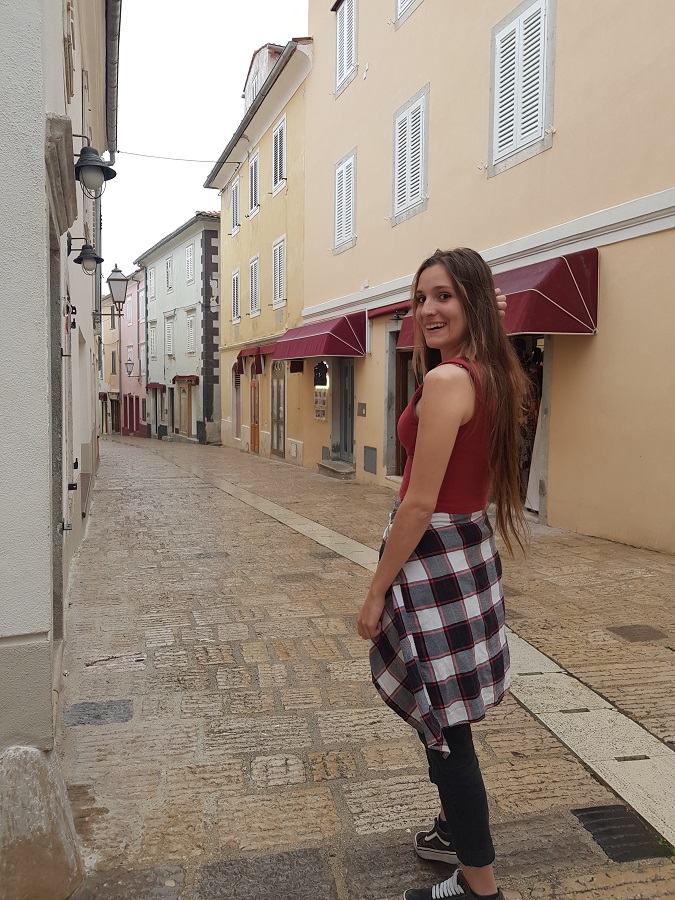
7. What advice do you have for others thinking about making a move from the diaspora?
I would tell them that if they have the desire, they should do it without thinking too much about it. It is normal to be afraid of the unknown and the unexpected, but in the end, they will always be grateful for having put it aside and come. There will be difficulties, but everything can be resolved along the way. I was scared, too, and yes, there were painful situations, but in the end, it was all worth it, and I would do it again from the beginning. Even if I had to relearn the language and start from cero without any friends, I would repeat it. It is not only for knowing the country of our grandparents and living in a beautiful place, but it also implies personal growth that no one can take away from you. I would also advise them to apply for the scholarship and explore Croatia. Whether if they want to live here or just travel, I think it's a first approach to the country and an experience worth having. In this way, they can learn the language and also see what life is like here. I would also tell them not to worry about the language or about coming without citizenship, as the people are kind and patient and will help them as much as they can. If you have Croatian relatives, look for them! For them, it is very important to know what happened to the grandchildren of their relatives, and they are going to receive them with tears in their eyes.
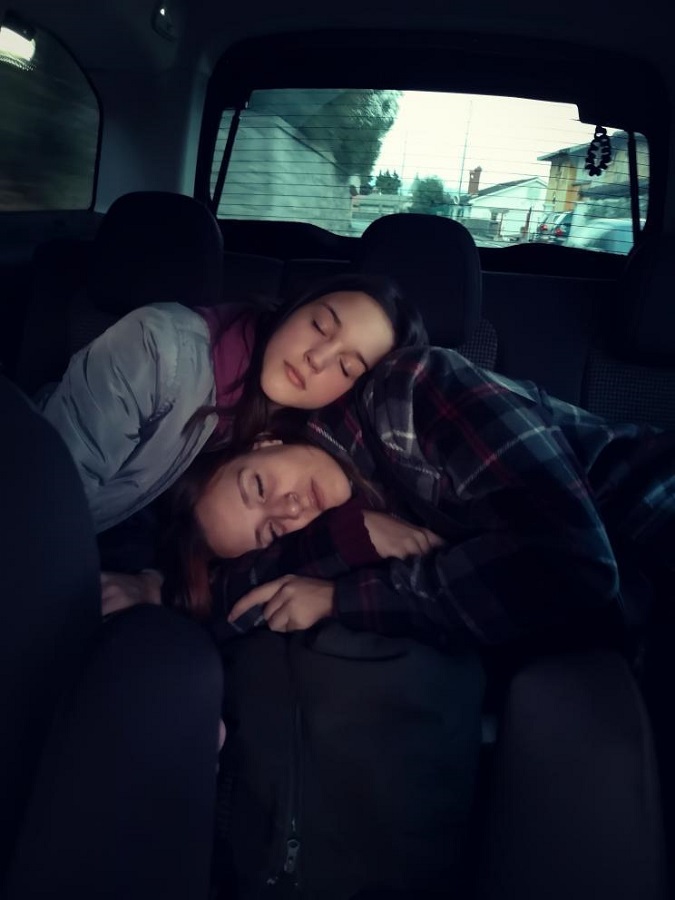
8. How do you think Croatia can better assist those who are looking to return to the Homeland?
I think Croatia is doing very well through the Scholarship program and the state office for Croats. However, I think that perhaps it could improve job placement since it is often difficult to find a job because you do not know where to look. The information inside and outside of Croatia could also be extended a little more since it is often necessary to ask about issues such as citizenship, residence, scholarship, etc., and the information is not so clear and accessible. There is not much promotion of the scholarship in Latin America, and many people do not know that this exists. They also do not know what papers are needed for citizenship and how it is processed within Croatia. To obtain this information, I had to ask many times and go to different offices, in addition to talking to my classmates.
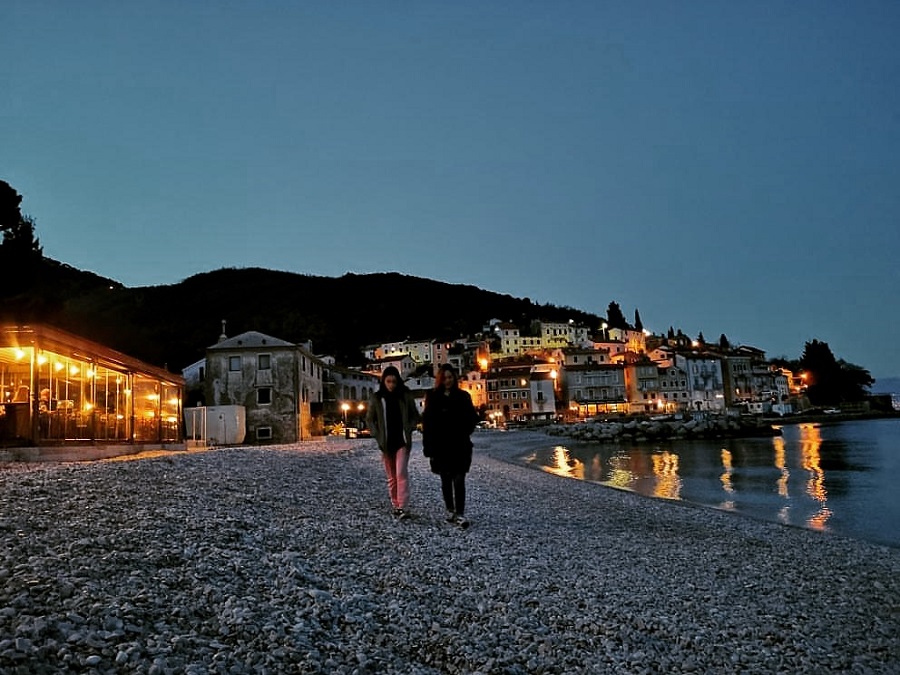
****
Thanks Nadia!
You can follow more stories in the Croatian Returnee Reflections series in our dedicated TCN section.
Would you like your returnee story - positive or negative - to be featured in this series? Contact This email address is being protected from spambots. You need JavaScript enabled to view it. Subject Returnee.
****
What is it like to live in Croatia? An expat for 20 years, you can follow my series, 20 Ways Croatia Changed Me in 20 Years, starting at the beginning - Business and Dalmatia.
Follow Paul Bradbury on LinkedIn.
Croatia, a Survival Kit for Foreigners will be out by Christmas. If you would like to reserve a copy, email This email address is being protected from spambots. You need JavaScript enabled to view it. Subject 20 Years Book


